#Are you a happy developer? Depends on where you live

Table of Contents
“#Are you a happy developer? Depends on where you live”
The average developer rates their happiness at 61 out of a potential 100 points, compared to the average OECD citizen who rates their happiness at 65. Hard to say if the comparison is fair, given the different data sets, but it suggests developers are not yet prioritizing their happiness.
Of course, there are huge variations in how developers evaluate their happiness depending on where they are located. Globally, Northern and Western European countries rank as the countries with the happiest developers.
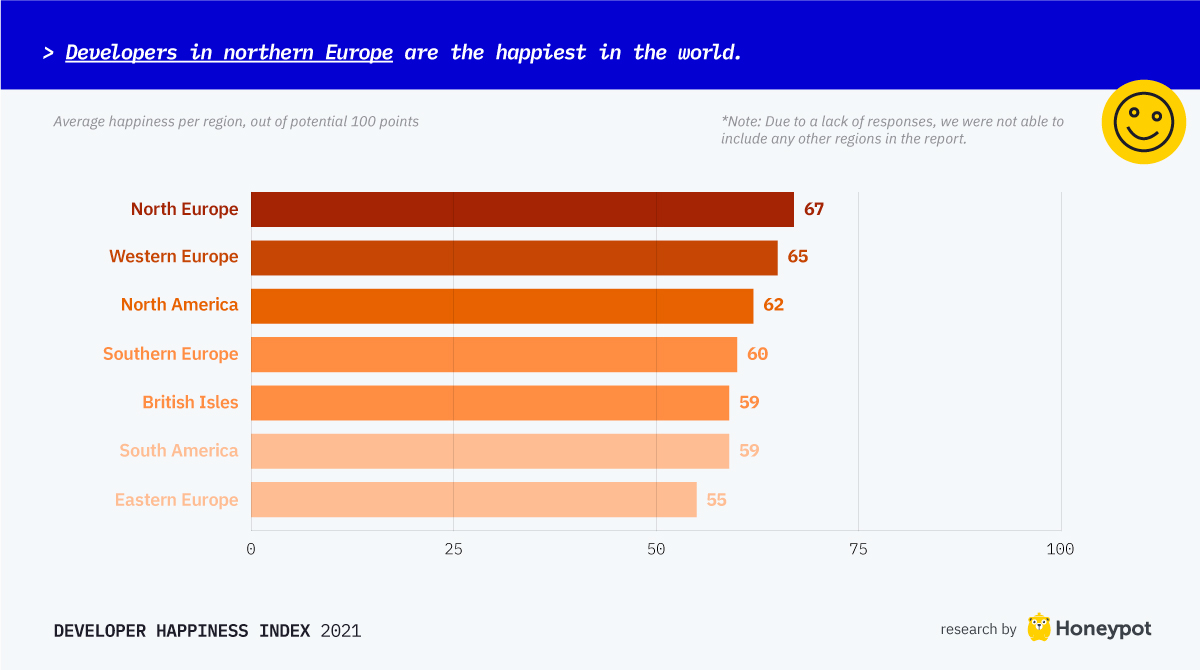
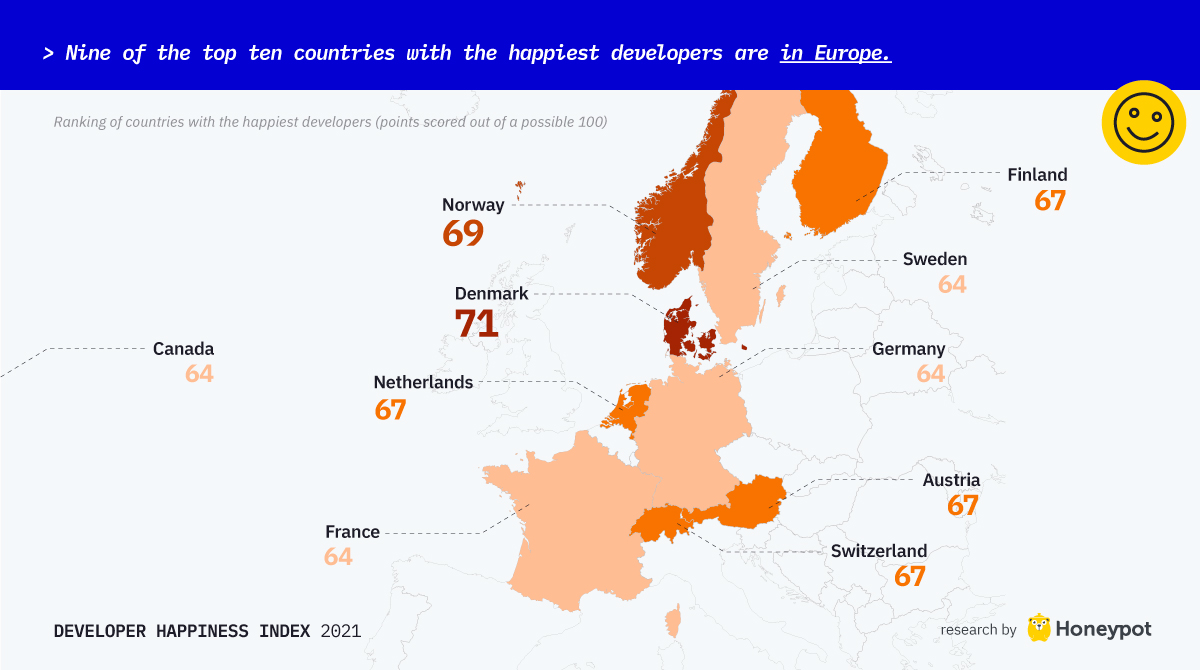
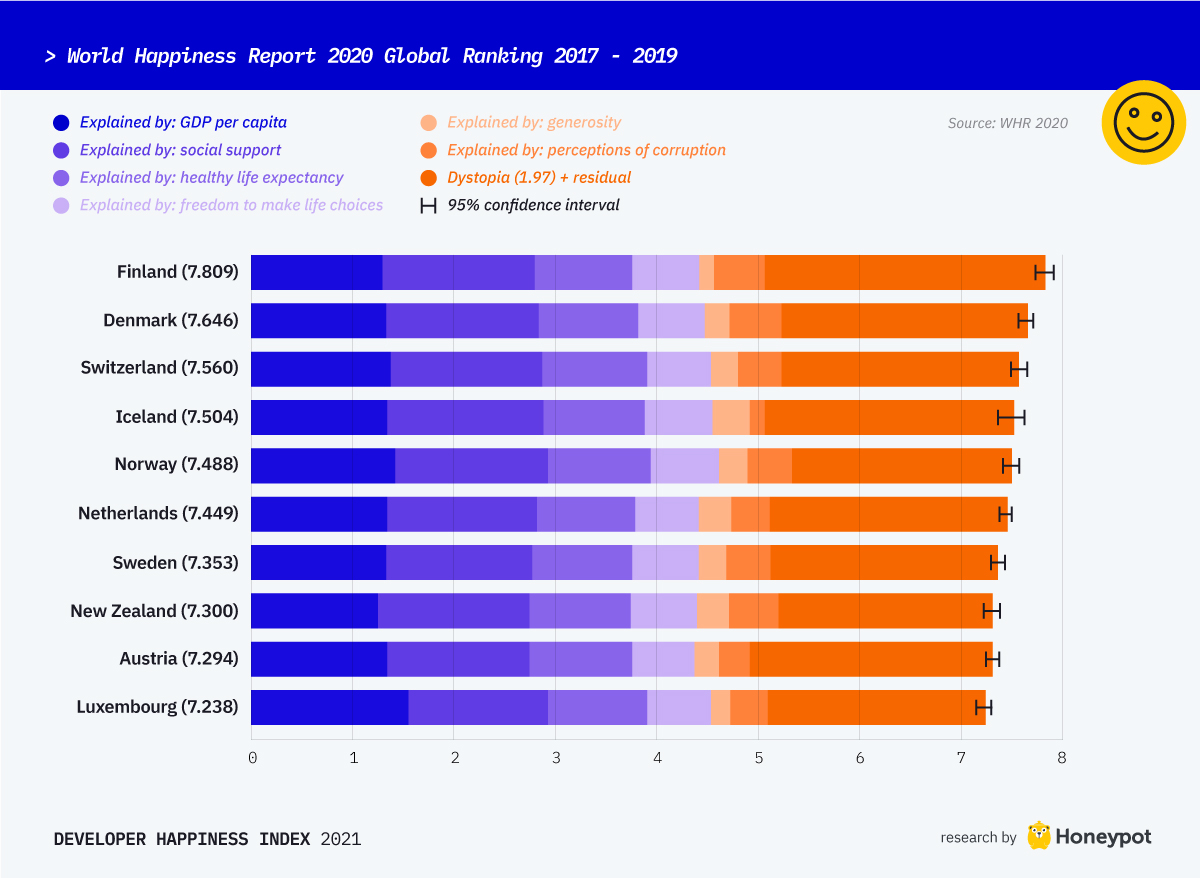
Relationships and personal autonomy are also important factors moderating happiness. According to the WHR “Nordic citizens experience a high sense of autonomy and freedom, as well as high levels of social trust towards each other, which play an important role in determining life satisfaction.”
The Netherlands, the country which takes the third spot on our rankings, tops OECD countries for high life satisfaction among young people. The education system focuses on developing autonomy and self-determination rather than obedience, resulting in happier people and better outcomes.
Stability and well-functioning institutions combined with personal freedom, safety, and autonomy seem to be the recipe that determines happiness in the countries that top both our index and the WHR.
We asked developers to evaluate 20 indicators across four categories by importance and then by satisfaction to derive self-evaluated happiness. Career indicators ranked highly in importance. Three of the top five indicators of happiness are related to developers’ careers — work life balance, learning opportunities, and work environment. It should be noted, however, that while the same scales were used, we did not explicitly ask developers to compare indicators across categories.
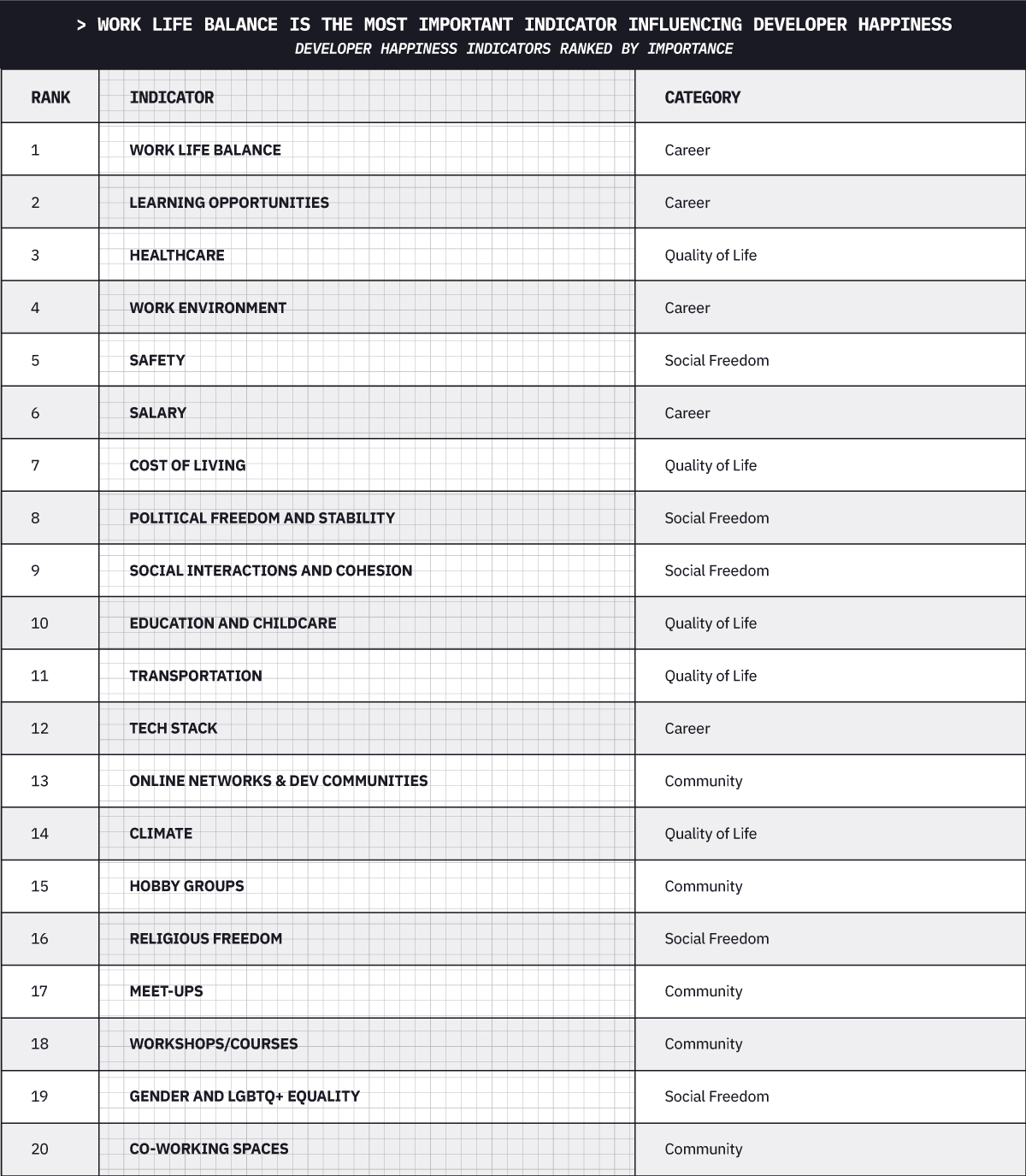
According to Harvard Business Review, employed people are happier and have less negative emotional experiences in their day to day lives. Further, non-monetary aspects of employment, such as social status, social relations, daily structure and goal achievement, are key drivers of well-being.
Since we spend a lot of our lives working, it is inevitable that work plays a key role in shaping our levels of happiness. From our analysis, we found that for developers, happy jobs are remarkably similar to happy countries: stable leadership, autonomy , and a sense of self-determination and achievement.
Healthcare and safety also ranked very highly as indicators of happiness amongst developers. Health and happiness are self-reinforcing, happier people tend to be healthier.
Across segments, developer happiness remained fairly constant, be it by age, gender or coding experience. As developers get older and gain more experience, they grow slightly less happy. Female developers are slightly more happy than male developers, though again there is only a small difference between these two groups.
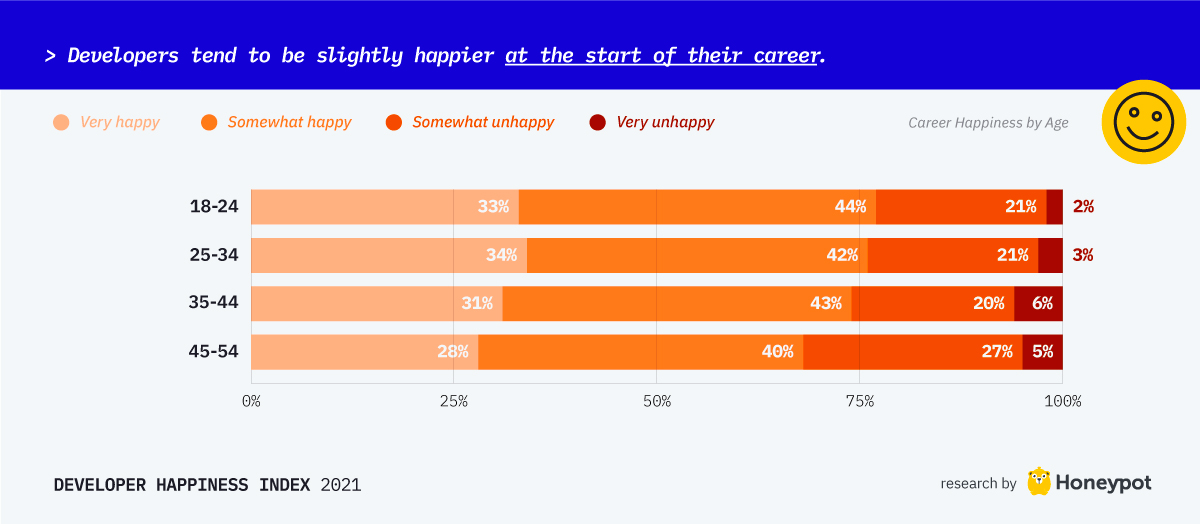
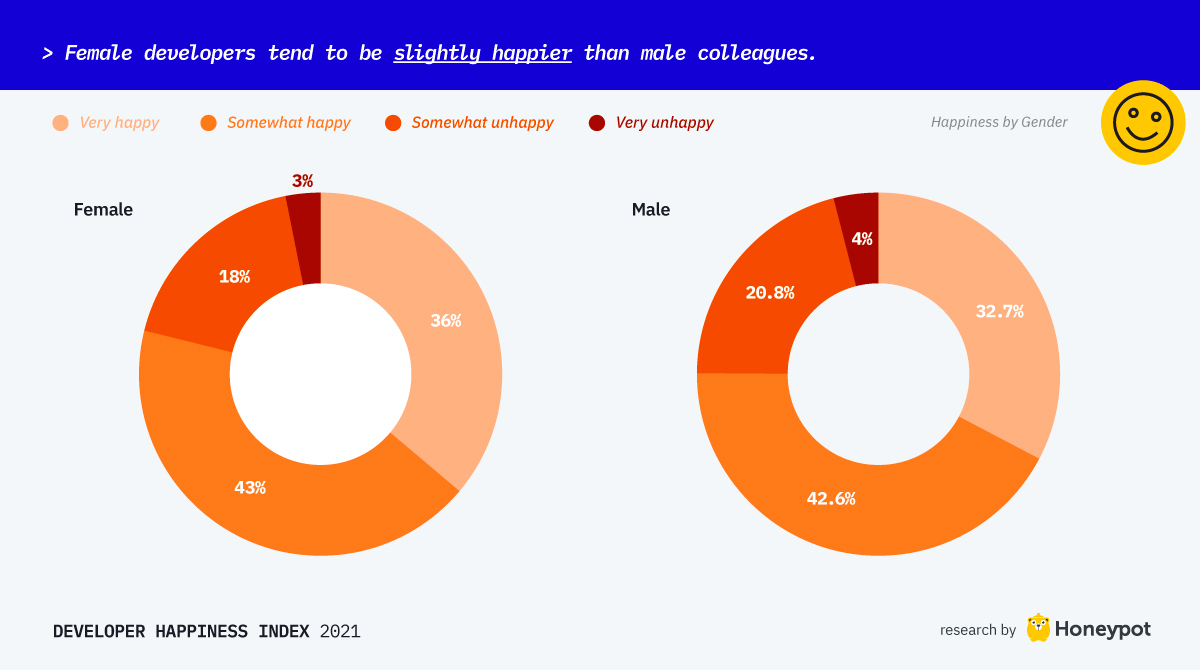
- Work-life balance is the most important predictor of developer career happiness.
- Developers in Northern Europe are most satisfied with their work-life balance — they also work the shortest hours.
- Satisfaction with work-life balance increases in trusting environments, where developers feel they have flexibility in their schedules.
- Older developers are less satisfied with working environments and company culture and begin to face ageism from the age of 29.
- Women are more satisfied than men with their salaries, though a large gender pay gap exists. The pay gap is largest in North and South America.
- The happiest developers at work live in the Scandinavian countries of Northern Europe. The unhappiest at work are based in Southern Europe.
- Companies with high employee happiness outperform their peers.
We all want to live rich and meaningful lives — at work and home — without sacrificing important aspects of either. When the balance is skewed, it can affect one’s physical and mental well-being, and that’s when things start to fall apart both inside and outside of work.
Work-life balance is the most important indicator for developer happiness at work, regardless of experience, age, gender, position, and region. 75% of developers cited this factor as “very important,” and 39% consider themselves “very satisfied”.
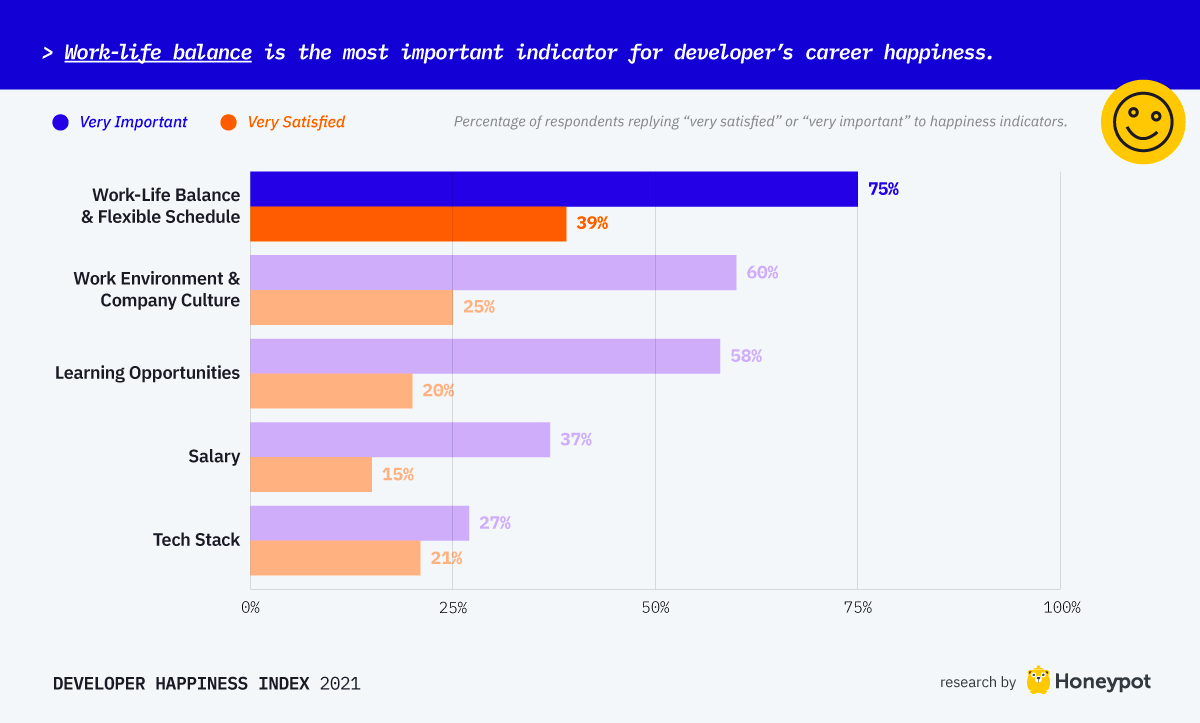
More than half of developers located in the Scandinavian and Nordic countries of Northern Europe are very satisfied with their work-life balance, higher than anywhere else in the world. They also enjoy shorter working hours on average than developers in all other regions (when measured by % working a 40 – 60 hour week).
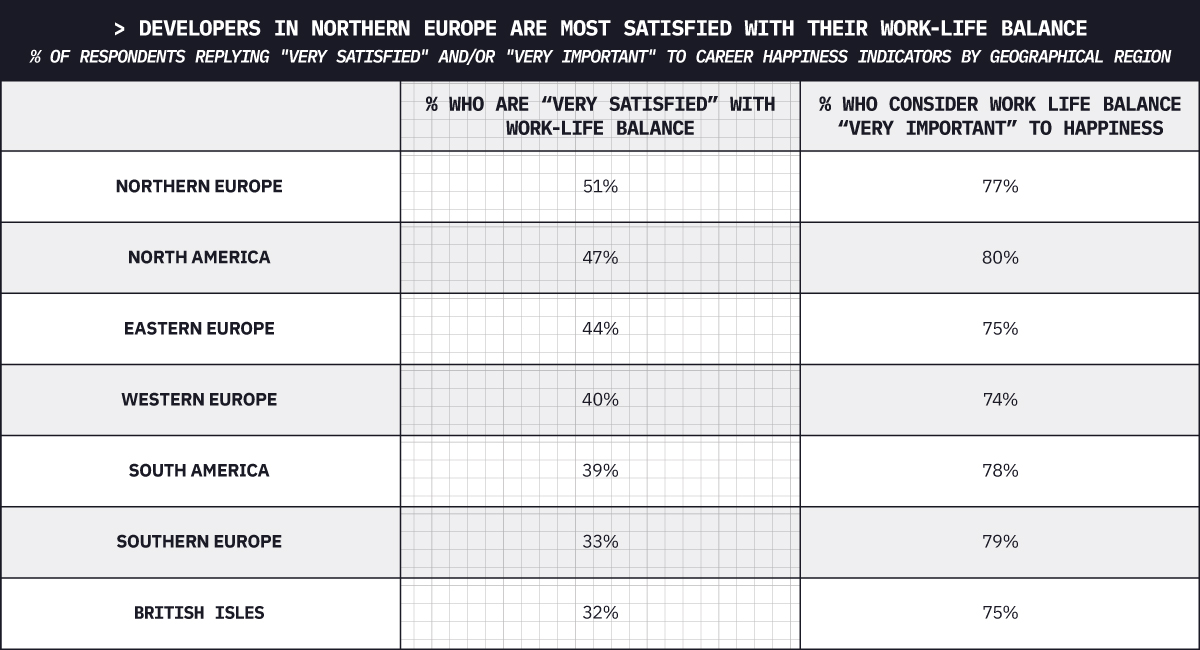
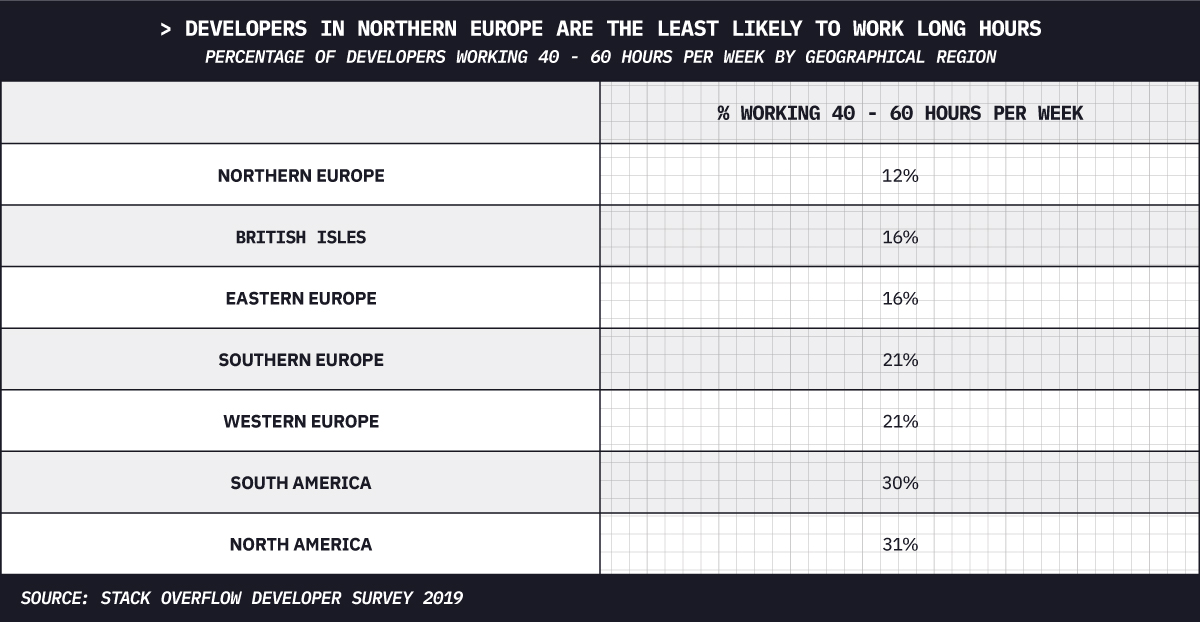
The positive results from Scandinavia’s six-hour workdays or four-day-weeks aren’t isolated to Europe; practices like these have been trialed in Chinese call centers and Microsoft offices in Japan with similar indications of increased productivity.
Scandinavia’s success in promoting work-life balance is powered by the high amount of trust between people, a culture of collaboration, and preference for consensus-based decisions, which leads to greater feelings of autonomy.
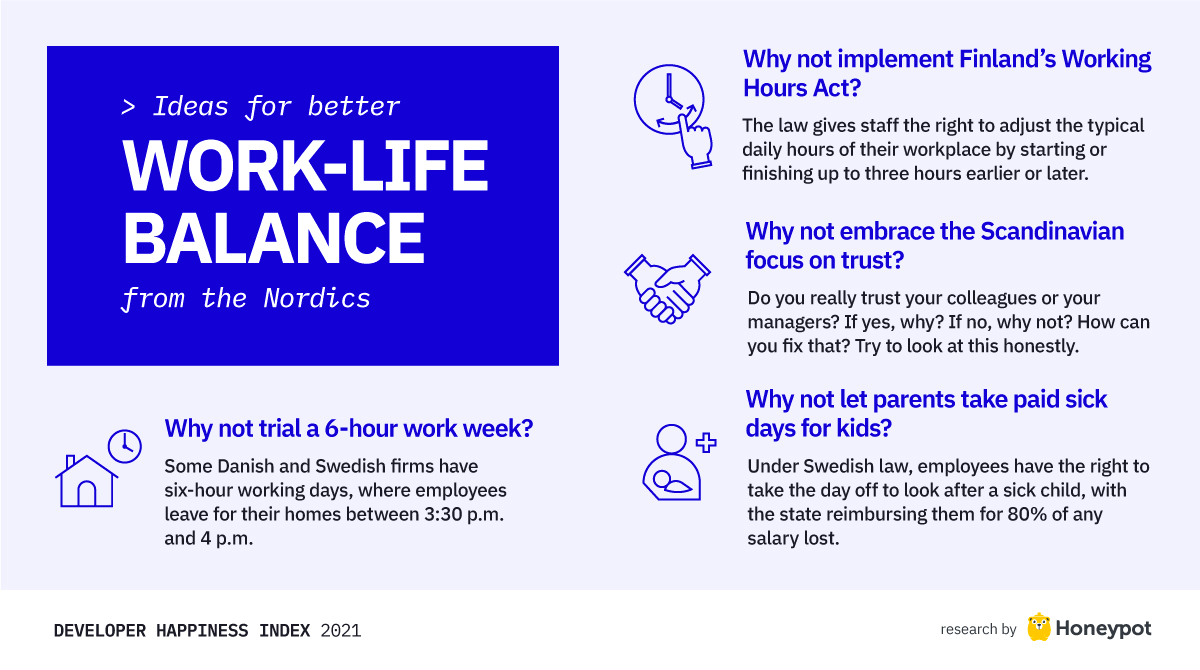
In the United States, large tech companies like Amazon, IBM, and others, employ the greatest number of developers countrywide and are at the forefront of progressive work cultures. These companies are renowned for implementing policies similar to Scandinavia, such as parental leave, health insurance, and dental plans.
Countries in Southern Europe work longer hours over longer workdays and have lower salaries compared to countries in Western and Northern Europe. In 2016, Spain’s employment minister called for companies to allow their employees to finish their workday at 6 p.m. rather than the long-held 8 p.m., which was no longer punctuated by long breaks.
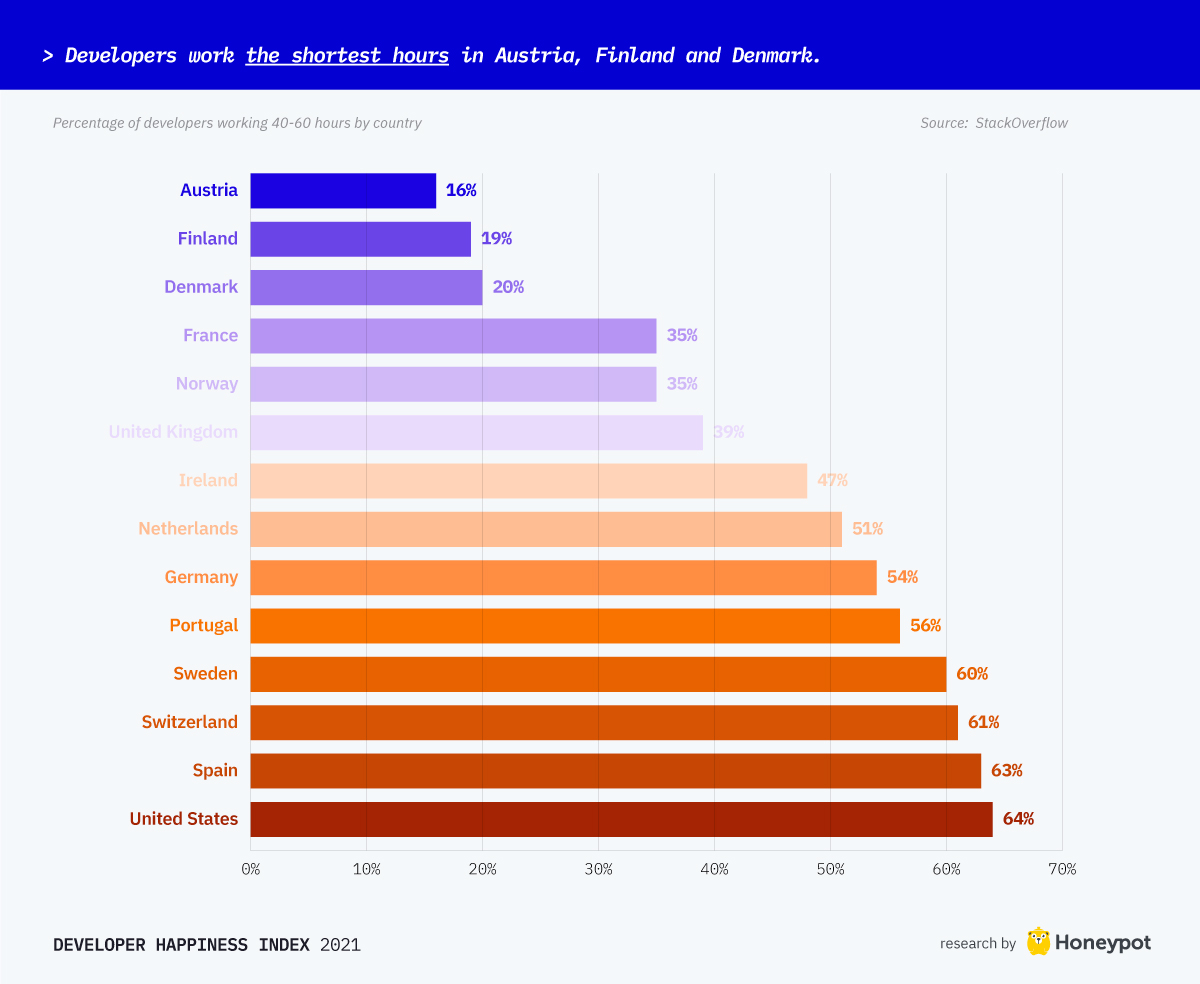
Remote work is often cited as a means to improve work-life balance. In our open comments section, remote work is mentioned nearly 200 times, particularly as a solution for noisy open offices and long commute times. COVID-19 has pushed many teams into remote situations and over time we will see if this does indeed impact happiness.
There’s often the temptation to make quick changes to improve work-life balance, but companies need to commit time and effort for policies to be successful. A 2019 Harvard Business Review article summarised the traps of implementing policies that are not well thought through:
- Flexibility does not always translate into a better work-life balance. Since employees can communicate with colleagues through their devices at any time, remote workers often experience high work-intensity and reduced autonomy. This constant connectivity can blur the boundaries between work and non-work activities.
- Paid family leave or childcare support can raise perceptions of unfairness in the workforce. Such policies are typically reserved for workers with caregiving responsibilities. They are much less accessible to workers who desire the same level of work-life balance but lack urgent family responsibilities.
- The majority of employees who do have access to flexible work arrangements are reluctant to use them. Many fear that doing so shows low work-commitment and will harm their career.
To maintain happy developers, it is essential to not only promote a healthy work-life balance but to live it. Employers need to train supervisors to be positive role models and offer practical and emotional support in topics related to work-life balance.
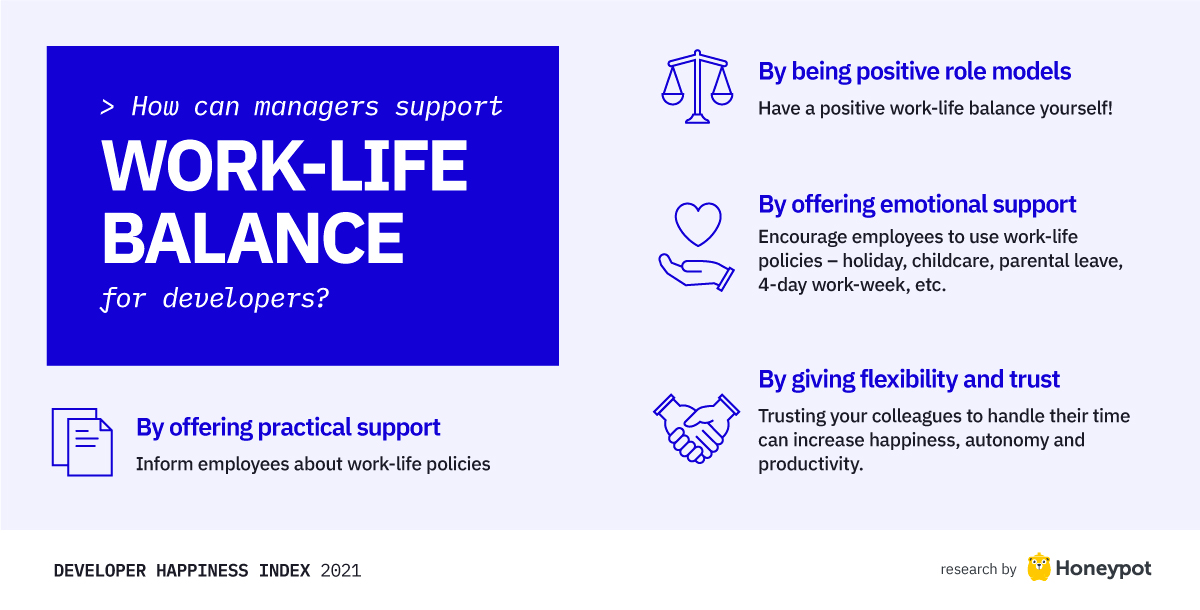
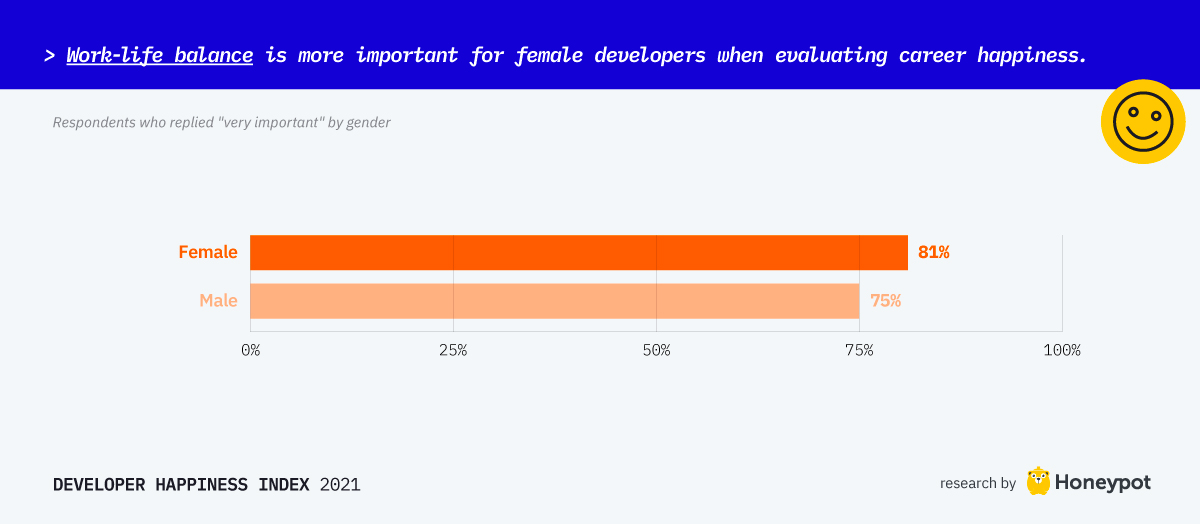
Jump into any Reddit or Quora thread and you will find plenty of vocal developers sharing their gripes with their work environments and company cultures. After all, 60% of them consider company culture to be very important, while only 25% are very satisfied, and the level of satisfaction decreases as the developer gains more experience.
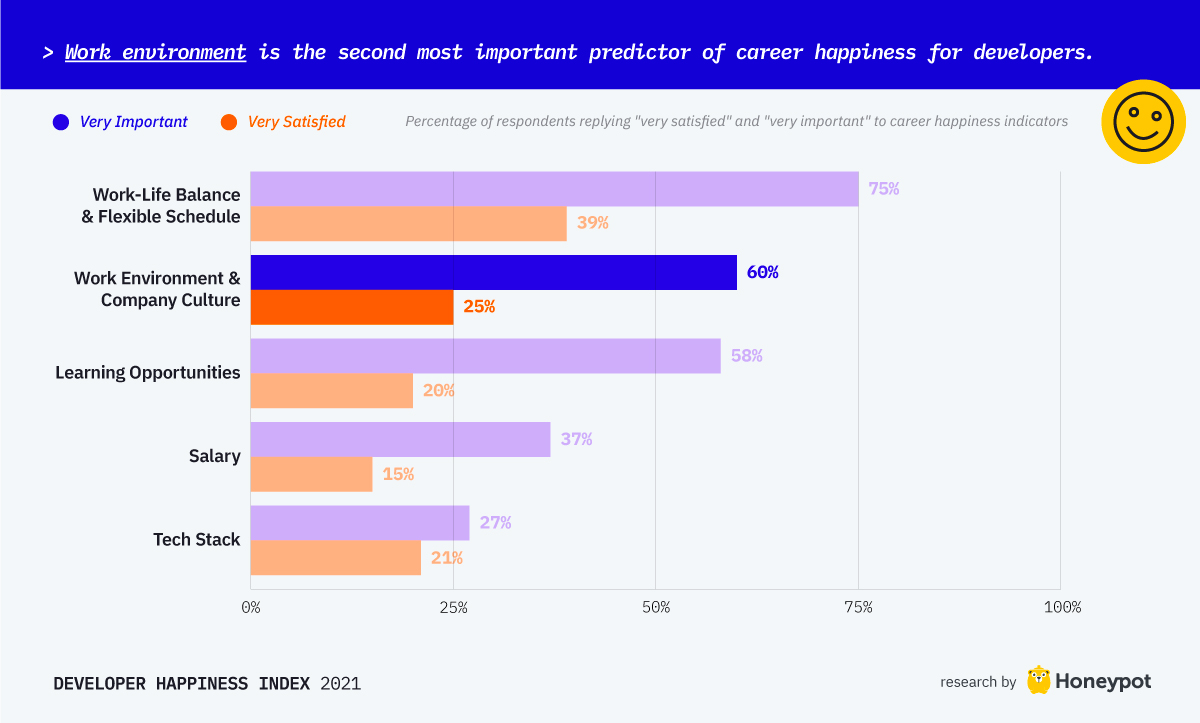
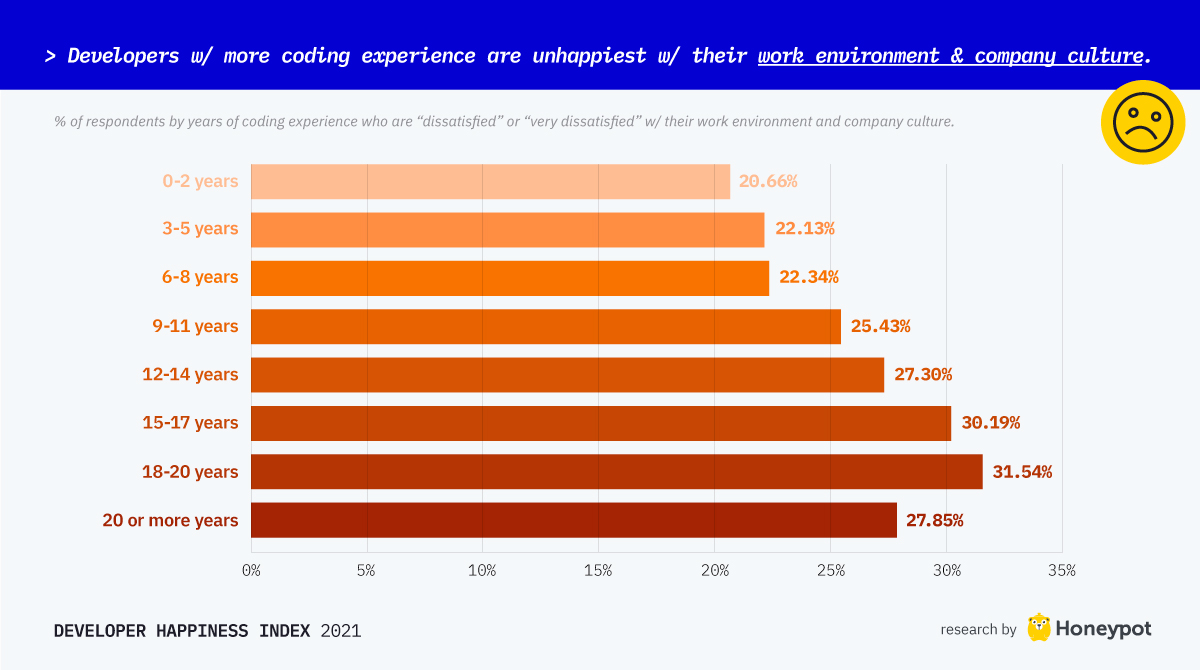
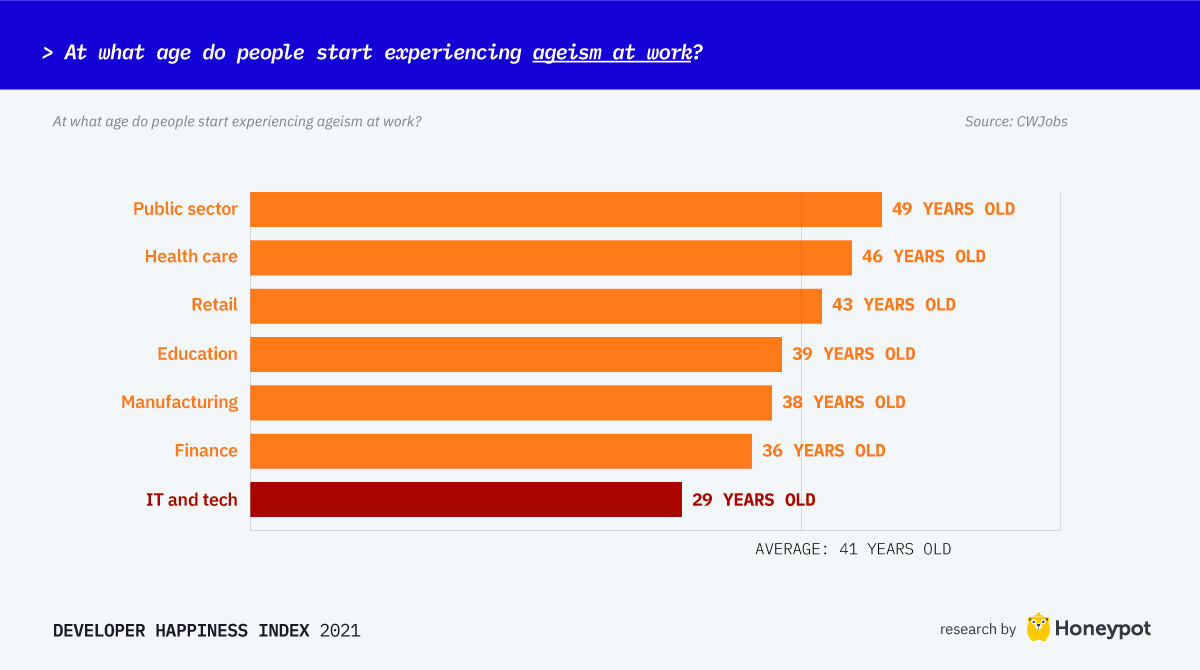
Creating a healthy work environment and company culture, which is relevant to all age groups, is an essential investment in any business. It reduces employee turnover, improves productivity and motivation, and naturally contributes to an overall sense of well-being and happiness among employees.
But how do you go about creating an environment and culture within which developers can thrive? In their words, it’s pretty simple: trust them, appreciate them and listen to them – and abandon the open-office structure, too.
In our survey, we posed the following question: What else, if anything, contributes to your overall happiness as a developer? From the 2000+ responses, most centered around relationships with teammates and management, recognition and appreciation, autonomy, meaningful work, and the general office environment.

Immediate Team
Given the collaborative nature of software development, it’s no surprise that developers care most about the team they’re on. In Gallup’s research, social capital, as measured through the support one receives from fellow workers, is positively correlated to happiness at work.
Developers say they want to be part of “passionate,” “diverse,” “cooperative,” and “supportive” teams. They expect responsibility to be shared, team members, to be open to knowledge-sharing, and product colleagues to be process-driven and focused.
Engineering’s relationship with Product can fuel productive, creative solutions or developers can see it as a major obstacle in building stable and valuable products. Collective responsibility and high trust – not just amongst engineers, but among the broader team – is desired by many:
“I value respect among co-workers and owning up to failure as a team rather than pointing towards a specific person or department. For example, not blaming just the QA team for a site-breaking bug making its way to production since multiple failures by multiple parties need to occur for this to happen.”
Among engineering teams, respondents crave mentorship and want to create open cultures of sharing:

“Working with developers of varying experience has taught me a lot. It doesn’t matter if someone has been at it for two months or 20 years, they may have something to teach me and I may have something to teach them. Contributions to solutions are great when shared with other people.”
Management
Management plays a significant role in developer happiness at work. Developers want managers who respect clean code practices and value coding as a creative process:
“As a developer, I want to write clean code and I want managers that understand the importance of clean code. I don’t want to work with people who force me to deploy untested code because “we need this feature working today.”
Many mention a desire to work for leaders who are committed to a bigger vision, who care, and who set a clear direction:
“A clear direction/target (ideally one that you believe in) for your product, confidence and pride in your product, and a sense of security (in terms of your company’s sustainability and the confidence you have in the company’s leadership) are the most important factors in my opinion, regardless of your position within the company hierarchy.”
The impact of management should not be overlooked. Developers state that they would “rather work for a good manager but use a bad tech stack” than vice versa; “poor management can make people change jobs or give up altogether,” and “the pay is decent, the tech stack is lacking, but my manager does not inspire or promote progress, so I am leaving.”
Recognition
In a recent Glassdoor survey, 53% of people said feeling more appreciation from their boss would help them stay longer at their company, and developers feel the same:

“I get a boost to my esteem from internal and external recognition and appreciation. It’s important how the company values my input, effort, advice and vision.”
There is a difference, however, between recognition and appreciation. Recognition is conditional, finite and in the past – we are praised for specific work we have accomplished. On the other hand, appreciation is about acknowledging one’s inherent value – not what a person has done, but who they are.
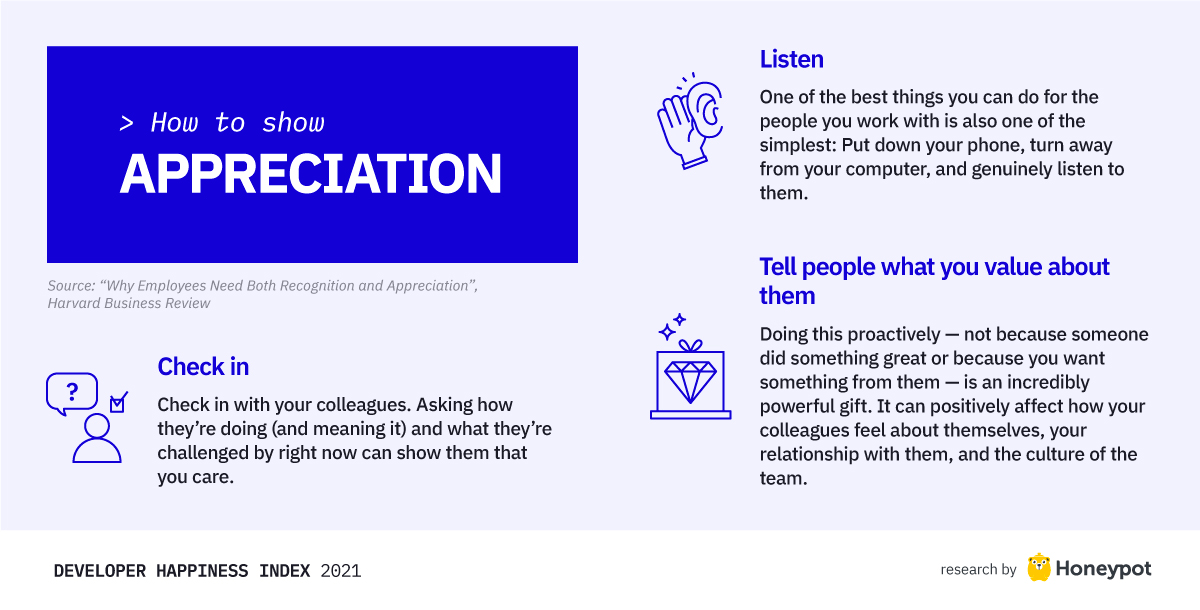
Autonomy and Trust
In an LSE analysis of 51 experimental studies of financial incentives, researchers found overwhelming evidence that these incentives may actually reduce an employee’s natural desire to complete a task and derive pleasure from doing so.
Counterintuitive, right? Not for Dan Pink and others, who for years have promoted intrinsic motivators – like autonomy – over extrinsic motivators, especially for people working on complex and creative tasks.
And autonomy is connected not just to happiness, but also to motivation. The Self-Determination Theory shows that motivation exists on a spectrum that is largely moderated by autonomy and that higher degrees of motivation can only exist in an autonomous state.
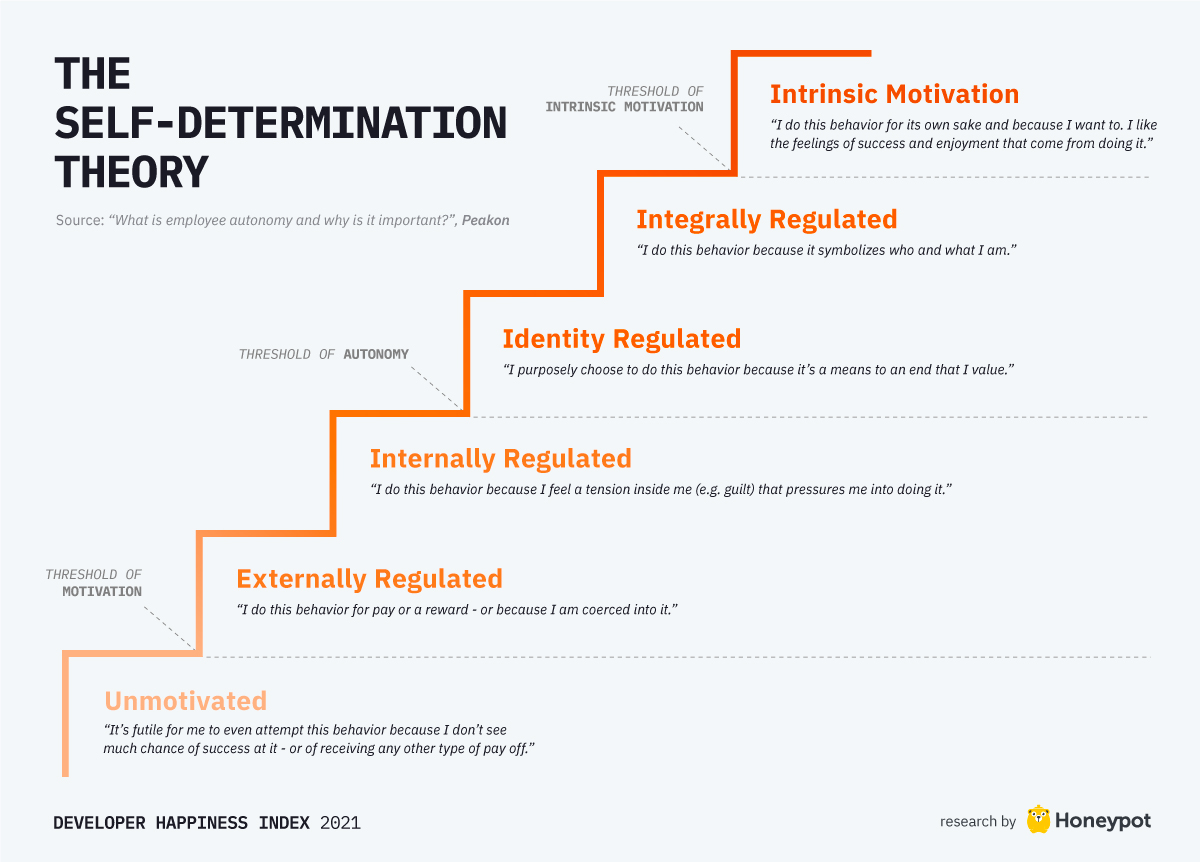

“We need to involve developers in the process of making decisions about tools, frameworks, best practices, and business requirements. We need to adopt software craftsmanship rules and collective code ownership on a bigger scale. Unit tests, SOLID, code quality should not be questioned.”

“I want some sort of feeling of personal ownership of what I am working on. In larger companies and bigger projects a lot of time things are just taken out of your hand and all decisions are being made somewhere else. This is very demoralising over time because I lose agency and it is hard to find that feeling of accomplishment which is important to me.”

“I want some sort of feeling of personal ownership of what I am working on. In larger companies and bigger projects a lot of time things are just taken out of your hand and all decisions are being made somewhere else. This is very demoralising over time because I lose agency and it is hard to find that feeling of accomplishment which is important to me.”

“Autonomy and the ability to be more than a code monkey. It is very important to be able to have input into a project and not just be treated like a machine that spits out code. Developers are creative problem solvers.”

“Being given fun and substantial dev tasks that might take some time to think about and architect intelligently rather than microtasks that need to be completed quickly and without any strategic thought.”
Meaningful work
Developers generally tend to be a well-intentioned bunch. Open source, for example, aspires to make knowledge free and widely available for all. Volunteer-run programs that help people learn to code exist in most major cities. And when it comes to day-to-day work, developers know purpose and meaning is important.
This fits with Dan Pink’s already cited Autonomy-Mastery-Purpose model, where the purpose is the need to work towards something meaningful and bigger than oneself.
Many developers expressed pride in “building the future” and a desire to avoid companies that “contribute negatively to social well-being.” And while some did express the desire to know their work was contributing to grand “social change”, many simply want to feel useful and understand their company’s role and their own place:
“It’s important to have the feeling that you’re contributing to something that matters, not just being paid to make somebody else even richer.”

“It’s important that I feel my work is benefiting people instead of businesses, and that it is solving meaningful problems as opposed to developing artificial digitalisation bullshit.”

“Sometimes we have the best tech stack, the best team, but we still feel that we are not contributing to society, and this generates a space to fill. I want the feeling of being useful.”
Office environment
The final piece of the puzzle to create a happy work environment and culture for developers is the office environment. According to Stack Overflow data, almost 42% of developers state that a distracting work environment is their biggest barrier to productivity, followed closely by meetings and being tasked with non-development work.
Comments from our survey respondents cite similar struggles; developers complain of “sharing an open office with louder departments” and that “employers should focus more on the physical and mental well-being of developers.”
Developers also expressed gratitude for companies that allowed them to choose their own equipment, not just laptops, but also desks, chairs, keyboards, and other hardware. Creating an office environment that developers want to work in is a fruitful step towards their happiness:
“A healthy work environment with no toxic relationships is important to me. I’d love to work in a place that has no office politics. I hate that.”

“I believe developers would be happier if there were greater availability of delicious healthy food options, and in general the company promoted a healthy well-being and lifestyle. My company took an active approach to that in 2019 and I was very happy with the results.”
Learning Opportunities: “It takes a lifetime to learn and a good developer dies learning.”
The most common reason we, at Honeypot, hear for developers changing jobs is the lack of growth and learning opportunities in their current role. 58% of respondents described learning opportunities as very important to their happiness at work, while only 20% said they were very satisfied.
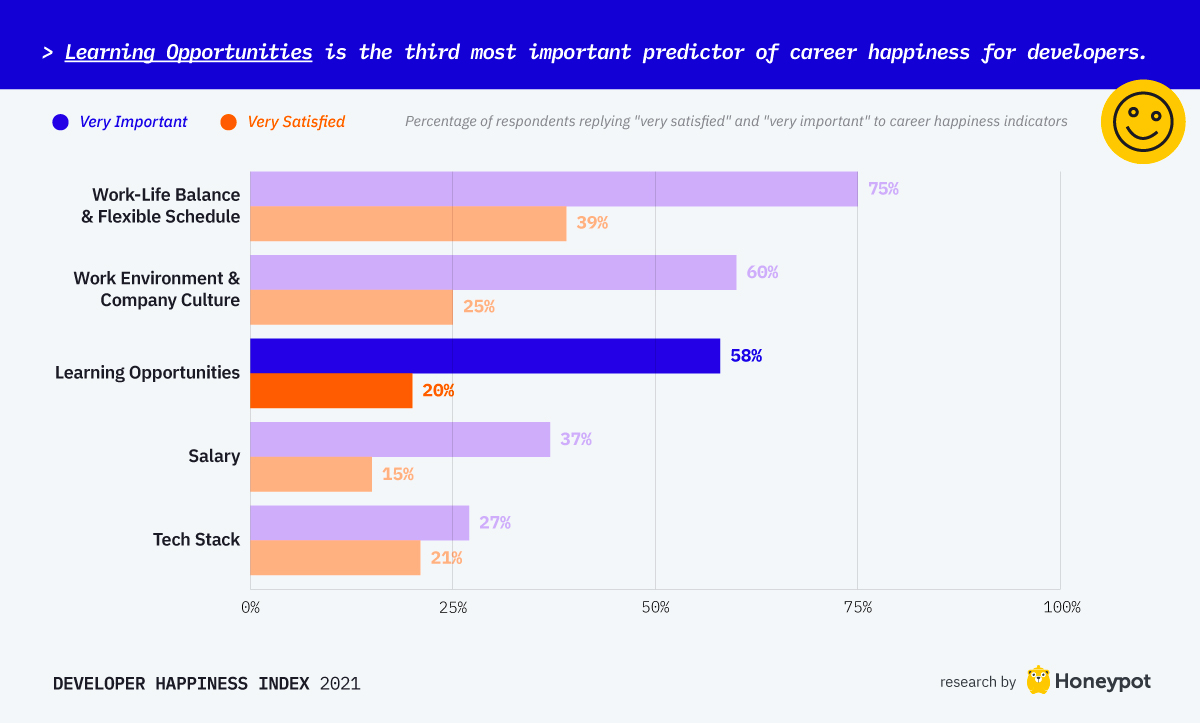
We identified two types of learning that are important to developers. One is creative or technical learning and the second is career growth. In the former, developers learn by doing, either autonomously or through mentorship. In the latter, developers define career goals with a manager and make a concerted effort to reach an agreed point.
For both creative learning and career growth, developers need time. In a world of such rapid technological change, the ability to learn is crucial to any employee’s success and should be encouraged throughout one’s career:
“An emphasis on value produced over hours worked, because the hours spent learning and getting your skills to a point where it’s a valuable commodity can’t be discounted once you’re good enough to produce value at a lower turnaround time.”
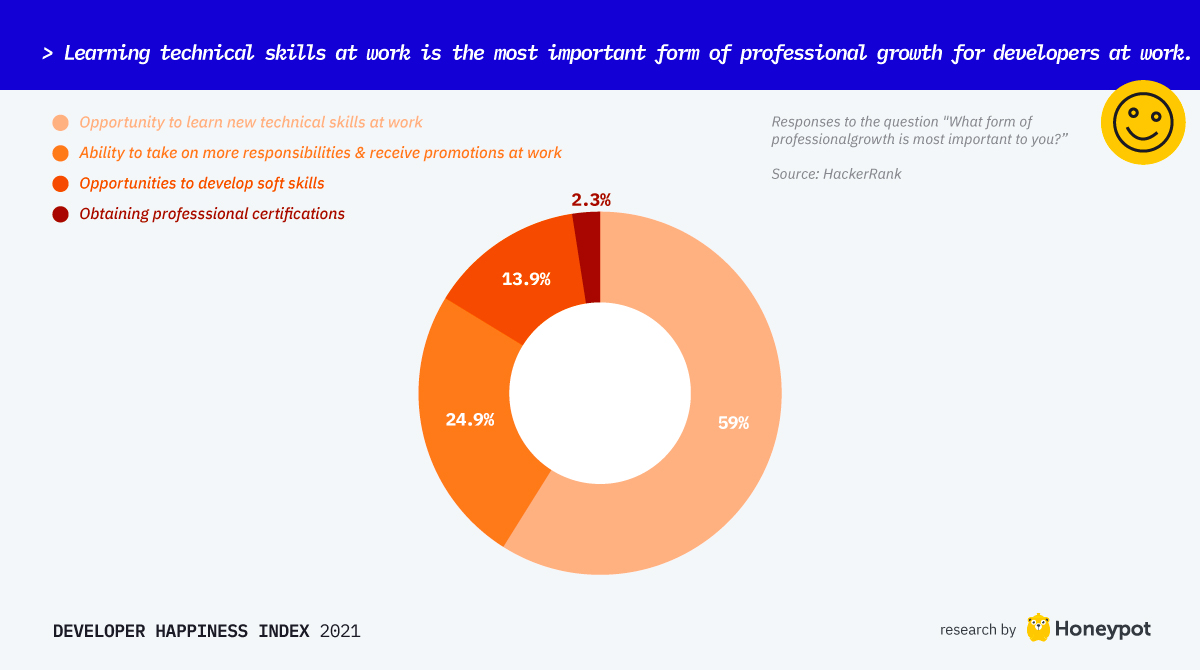
Career growth is a priority for many developers. Still, respondents report that as they gain more coding experience, they often feel herded into leadership positions and must provide support for junior developers.
While this can certainly be a huge opportunity for some, it also leaves many feelings neglected in their own growth. They code less, engage in more administrative tasks, and must play office politics, which explains why satisfaction with learning opportunities diminishes from nine years of experience onwards.
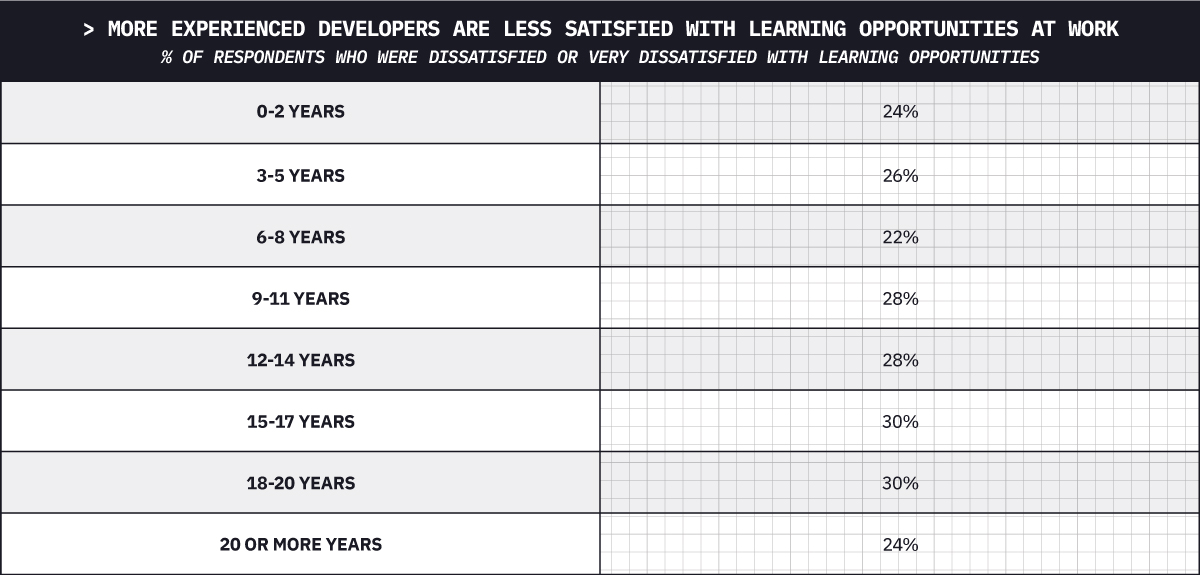
“A more flexible career path where one can face more technical challenges and increase their salary without the obligation of moving towards a “people manager” position.”
Career pathing is not an easy task: there is a lack of standardization among titles between companies and it can often feel like an over-engineered process. Nevertheless, a concerted effort between engineering and HR teams can create structures that allow people to understand which route they want to take. Otherwise, companies will lose talented people:
“Stagnation in the same position doesn’t make a developer happy. Here I mean having a clear and transparent career path (one of the main reasons for me to look for a new position after being in the same company for over five years).”
Salary: Money is important but it doesn’t buy happiness
The relationship between money and happiness has been debated for years. Countless studies have tried to establish a link between people’s earnings and their emotional well-being. Large scale reviews of research confirm that the amount of income does matter, but only to the point of being able to afford a “comfortable” lifestyle. Beyond this, happiness seems to plateau.
Recent research pinpointed $95,000 as the exact figure at which salary no longer increases our sense of well-being. The researchers suggested that it is not higher income itself which drives reductions in well-being, but rather the fact that high salaries are often accompanied by higher work demands, increased material demands, and, importantly, increased social comparison.
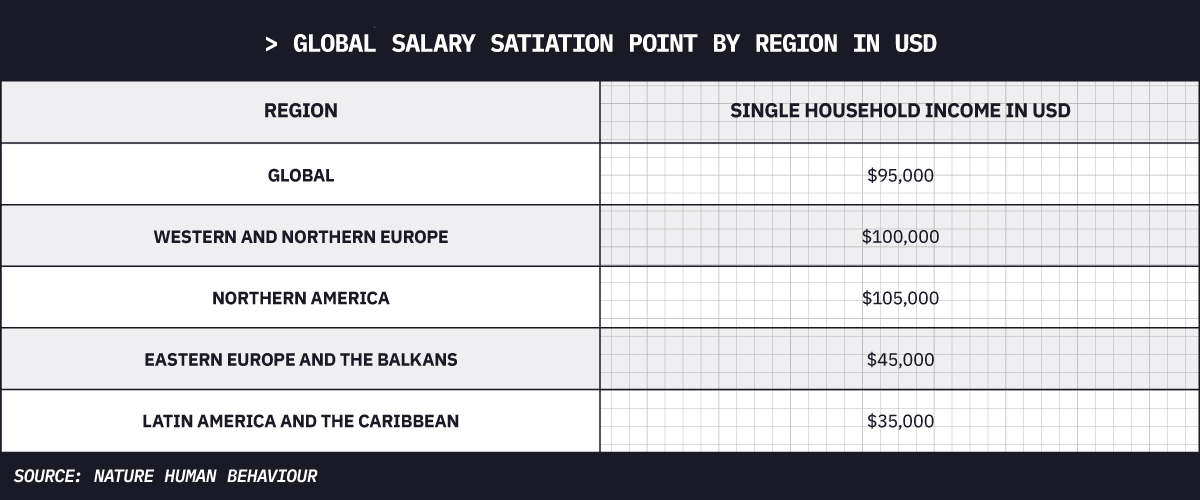
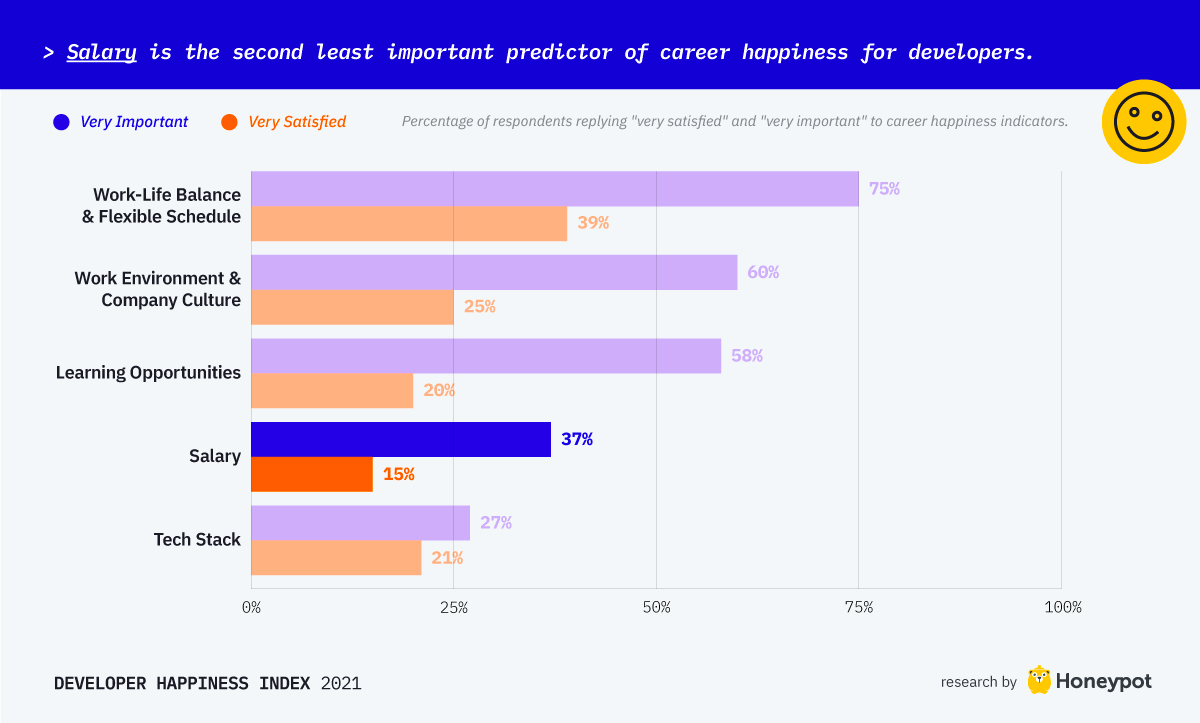
The high salary satisfaction in Eastern Europe is interesting, considering the average income is lower than in other parts of Europe. Certain Eastern European countries have large outsourcing industries, which could mean higher salaries than the average person. In Ukraine, for example, over 60% of developers work for outsourcing companies, and the average annual salary of an outsourced developer in Eastern Europe is €76,900.
Just under a quarter of developers in North America are very satisfied with their salaries. Five of the top 10 most in-demand jobs in the US are software engineers. Frontend engineers had the best jobs in 2020, as measured by demand and satisfaction, according to Glassdoor. Frontend engineers earn $105,240 on average per year, the exact peak of salary satisfaction in the US for single households.
Once again, developers in Southern European countries get the short end of the stick. They are the least satisfied with salary and according to the OECD, the average salary for a developer in Spain and Portugal, the southern European countries with the largest number of developers, is €28,000. This is just over half of the average salary of their Northern European counterparts in Norway, Sweden, and Denmark.
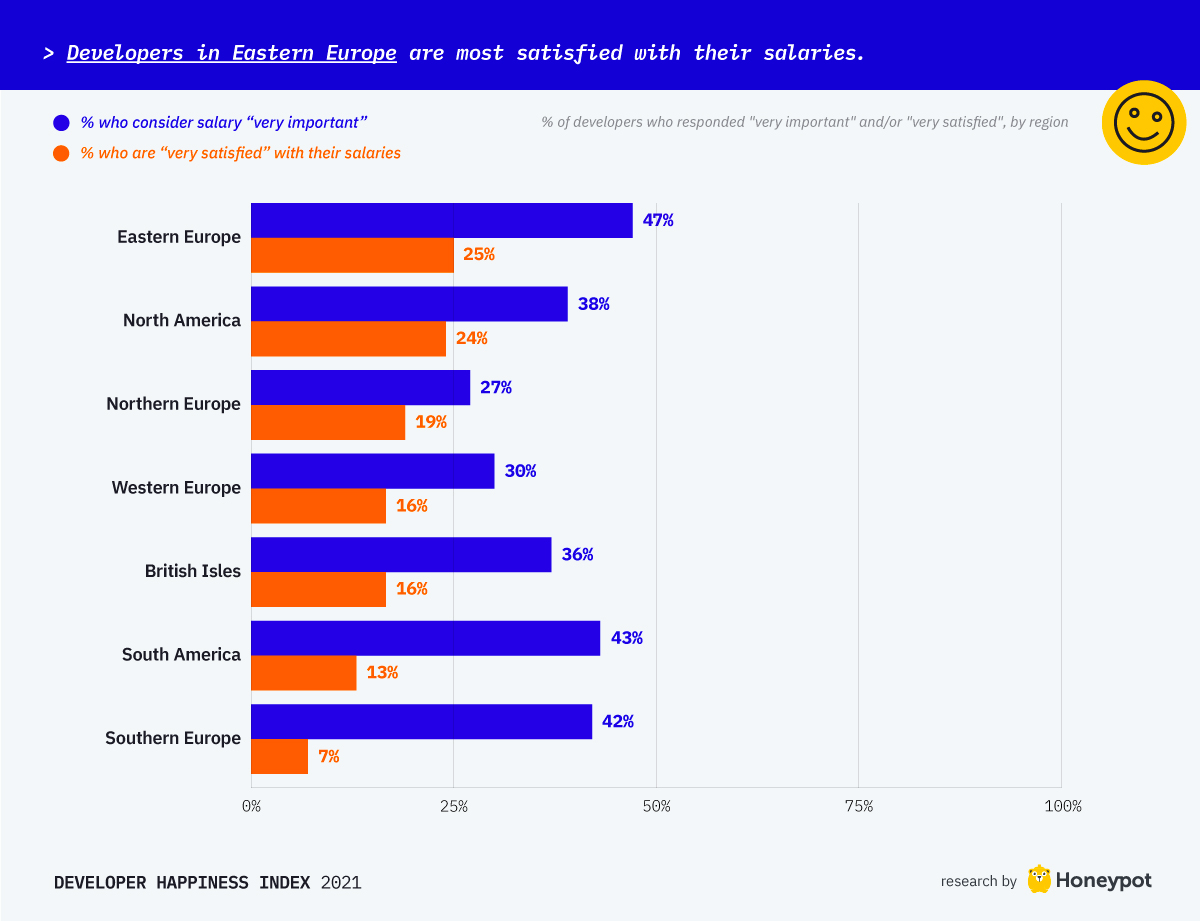
While both men and women place equal importance on salary, female developers tend to be more satisfied than male developers with their salaries. In 2019, InHerSight found that overall, women working in the tech industry report the highest salary satisfaction of all industries.
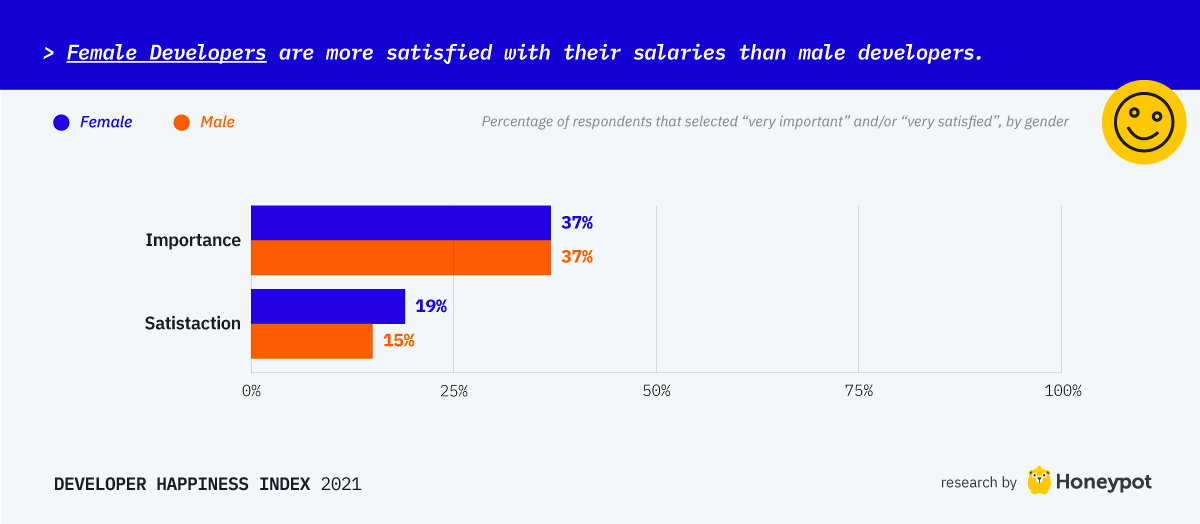
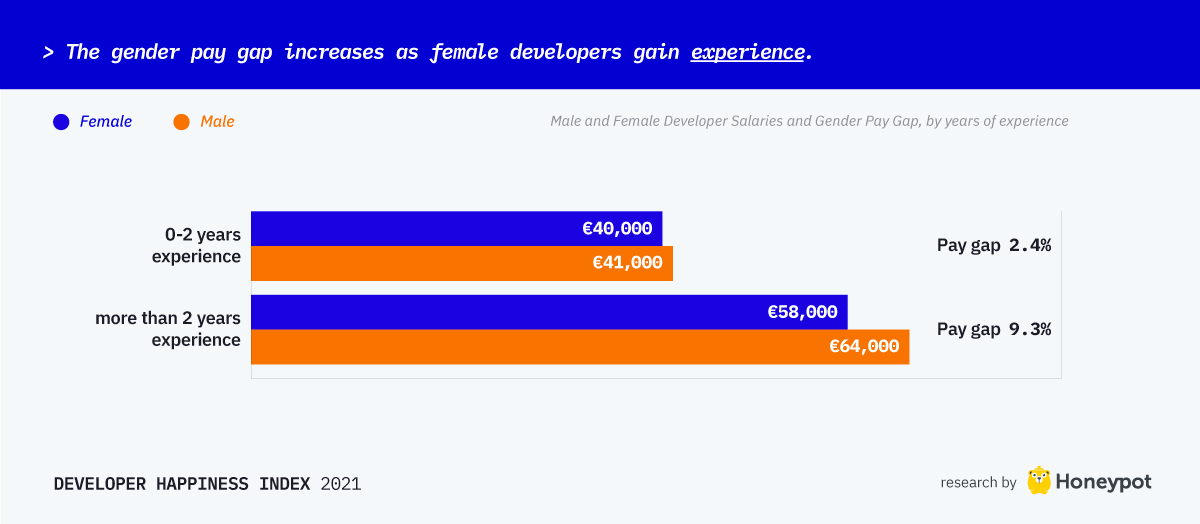
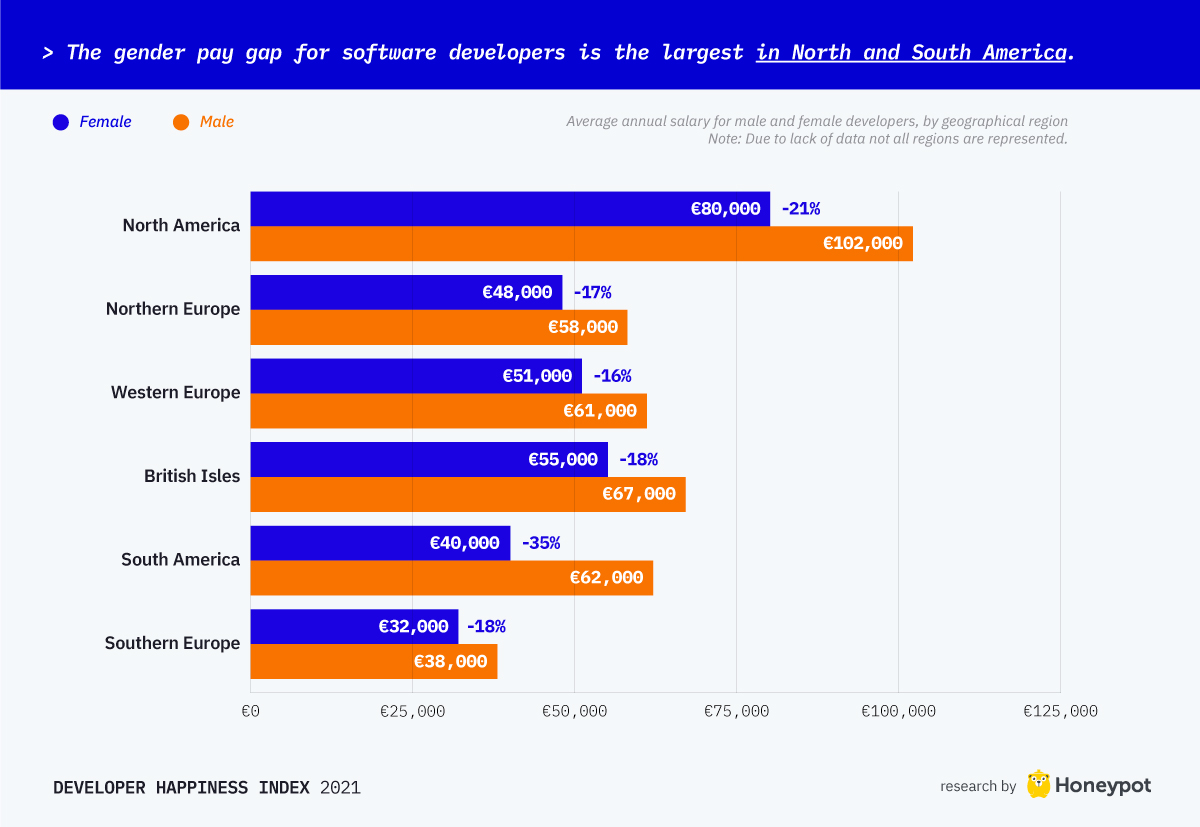
Tech Stack: Ask the developers what they want
While the tech industry moves quickly, companies don’t need to adopt every new, sparkly language, framework or library released.
And while tech stack ranks as the least important factor in determining developers’ happiness at work in our survey, it is still considered very important by almost 30% of developers and somewhat important by a further 48%.
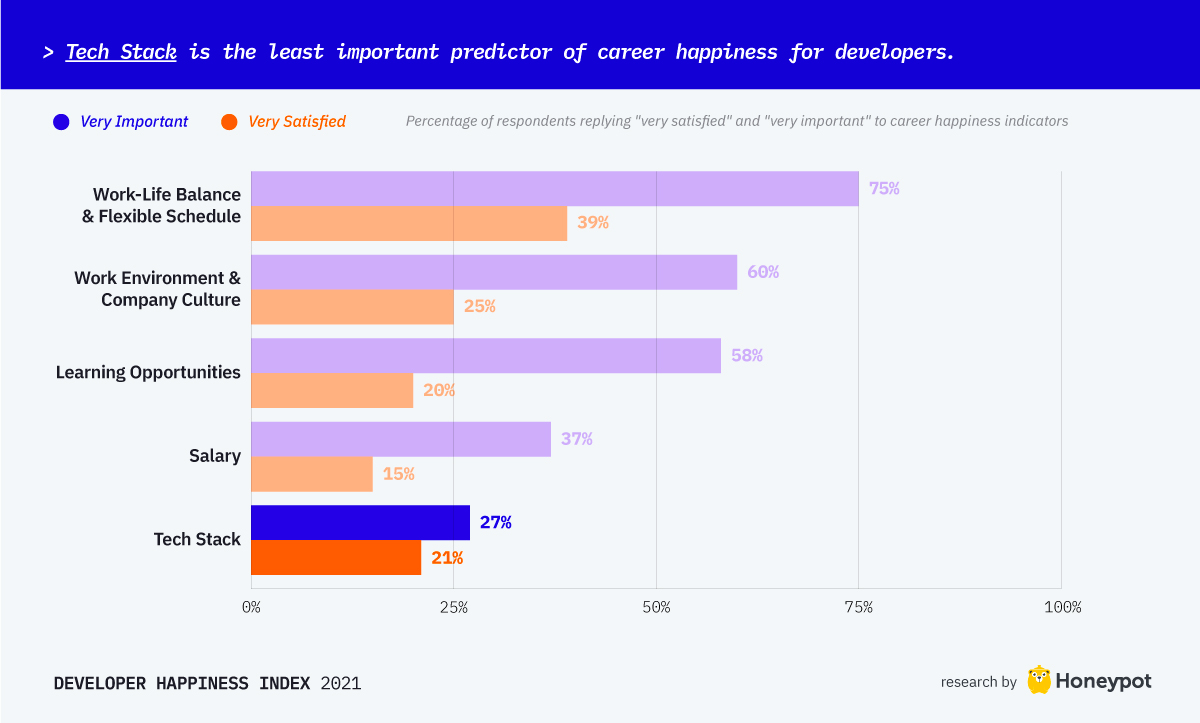
Poor code quality and sloppy coding practices, unexplained broken code, and imposed limitations on development are common frustrations developers face, slowing down their output, and leading to frustration and feelings of inadequacy.
Developers are frustrated with companies who rush into technical, infrastructure or architecture decisions without developer input. And misapplication or reimaginings of software development methodologies, like Agile, or startup trends, like MVPs, have also left a bitter taste for many:
“If there is one thing that made my work less and less enjoyable in the last few years, it is the horror of inappropriately and pseudo-religiously applied so-called “agile” principles. For someone who worked as a developer for 20+ years, I can definitely say that my craft has been horribly devalued by all kinds of coaches, bad middle management and consultants trying to force their view on what software development should be, onto people who would have done an excellent job doing their shit – just being left alone and in peace.”
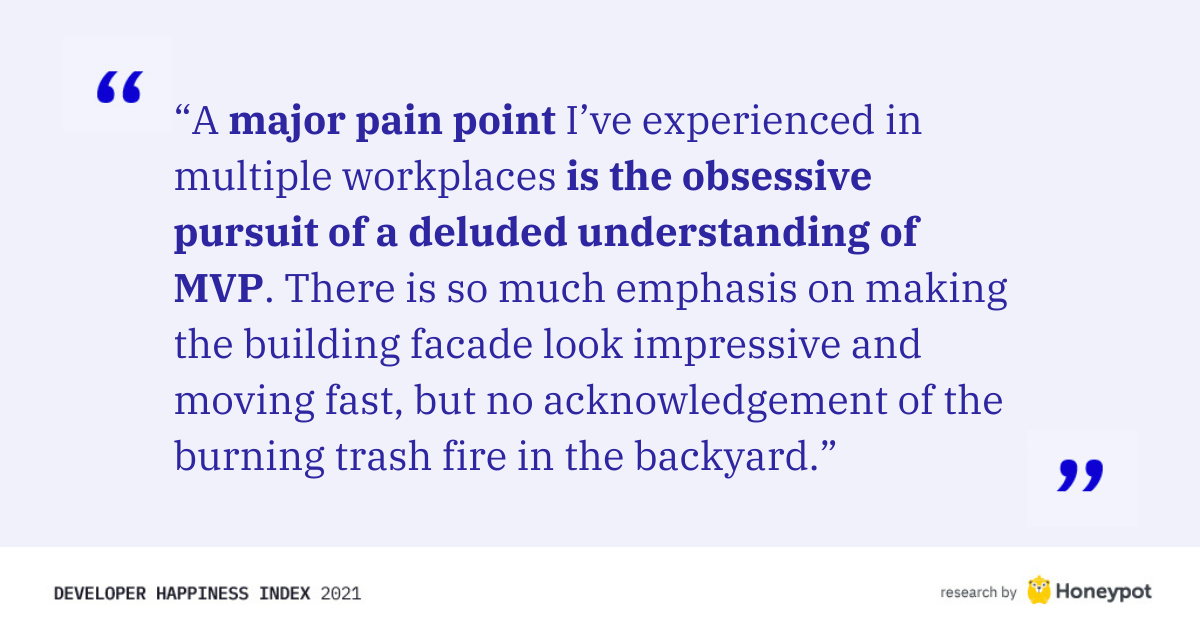
The solution to dissatisfaction over tech stack? Pretty simple — involvement. One developer explains:
“We need to involve developers in the process of making decisions about tools, frameworks, best practices, and business requirements. We need to adopt software craftsmanship rules and collective code ownership on a bigger scale.”
“I think for most developers the perfect job would be the research field, to discover and give solutions to new problems every day.”
Engagement, motivation, and happiness
Developers have been clear about what makes them happy at work, and it isn’t necessarily extrinsic factors like salary. In their own words, a healthy work-life balance, the ability to engage in continuous learning and career growth, and being a part of a healthy work environment and company culture are most conducive to their overall well-being and happiness.
Companies racking their brains for ways to increase developer happiness in the workplace, need to simplify their strategy — provide opportunities for developers to speak up and listen to their responses. And take happiness seriously; it’s not just an ethical imperative, it’s an economic one.
Snapshot Quality of Life
- Developers in Denmark, Austria, and Norway have the best quality of life.
- Healthcare is the most important predictor of a developer’s quality of life happiness — 59% of developers consider it to be very important.
- Developers in the British Isles are least happy with their quality of life.
- Access to mental health services is a priority for developers: the best mental healthcare is in Northern Europe.
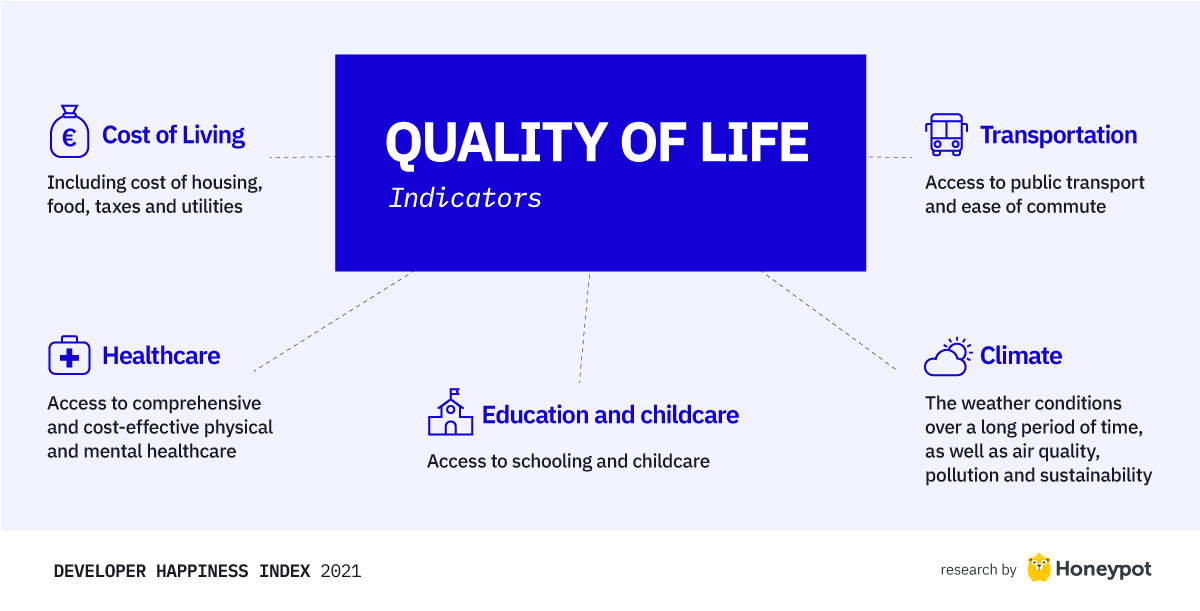
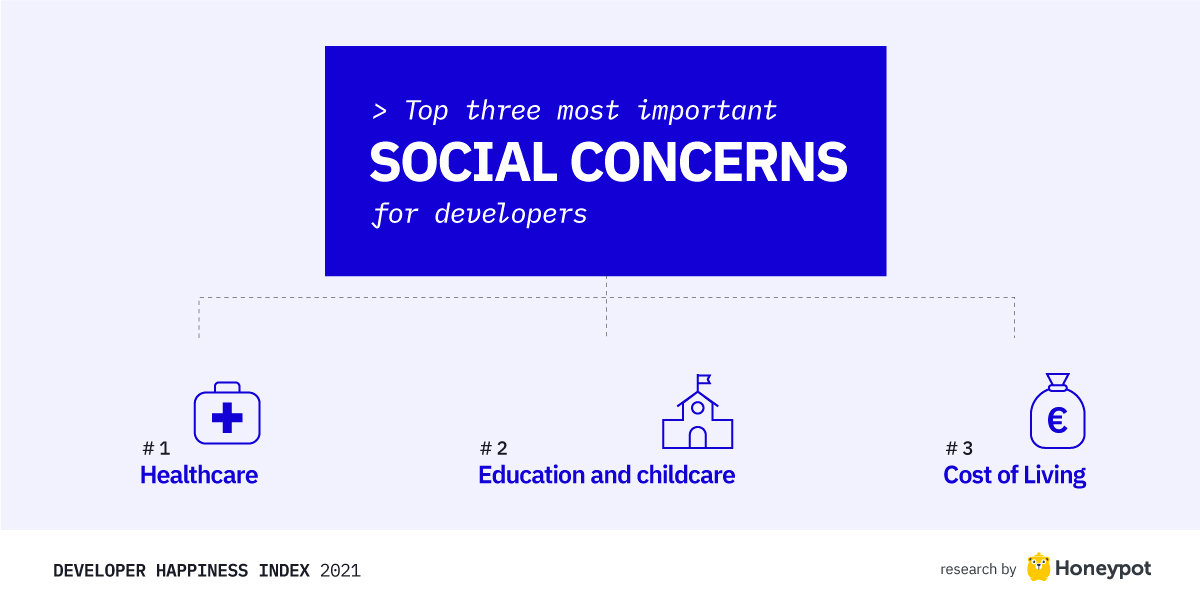
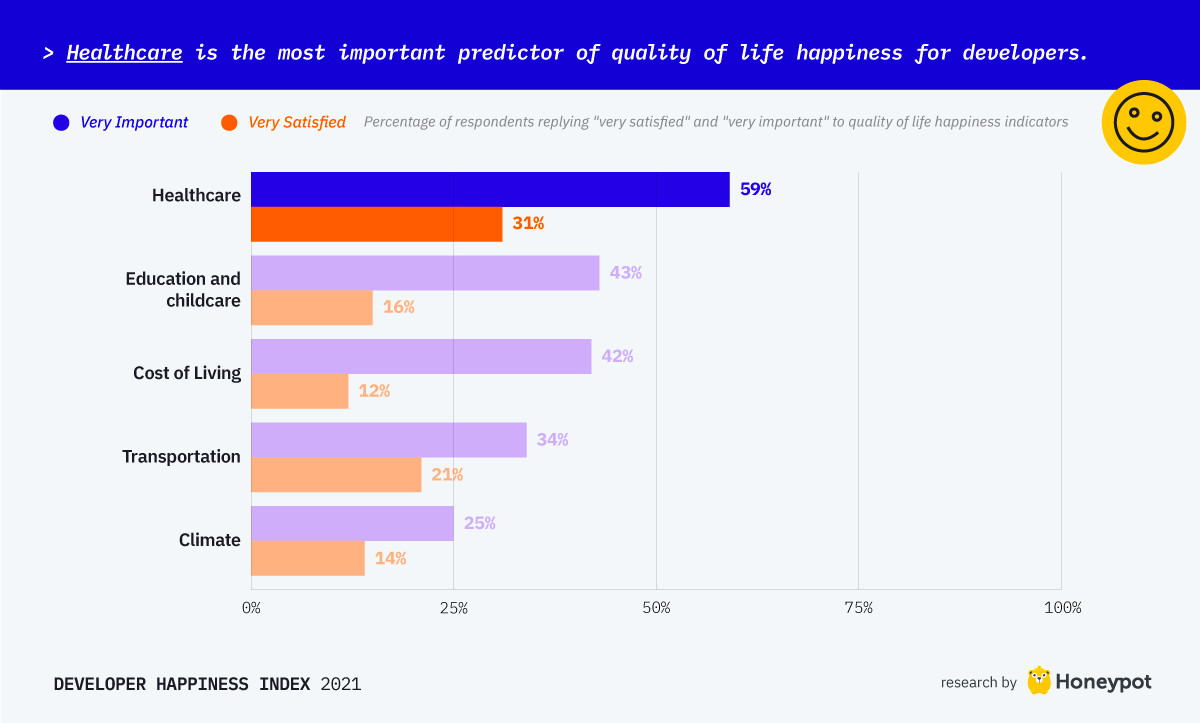
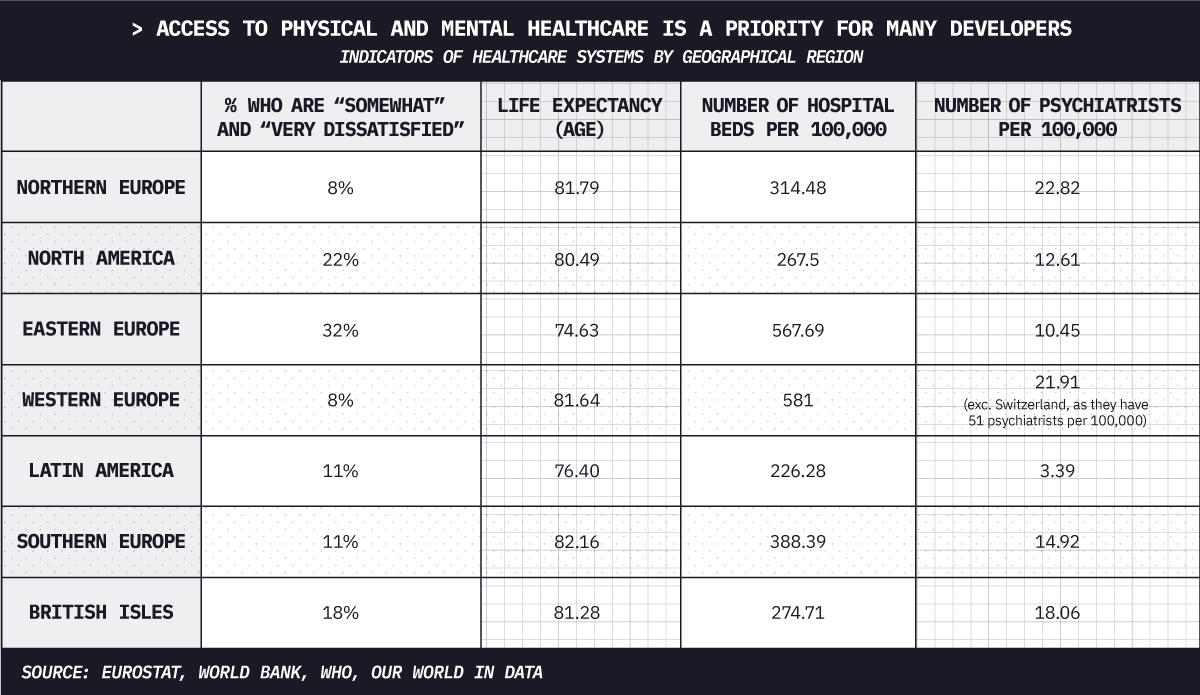
“I feel like almost all developers go through depression and anxiety at some stage.”
Mental health has been a topic in the developer world for many years. In its annual developer survey, StackOverflow reported that almost 15% of respondents said they suffered from a mental health issue, such as anxiety, depression, or ADHD.

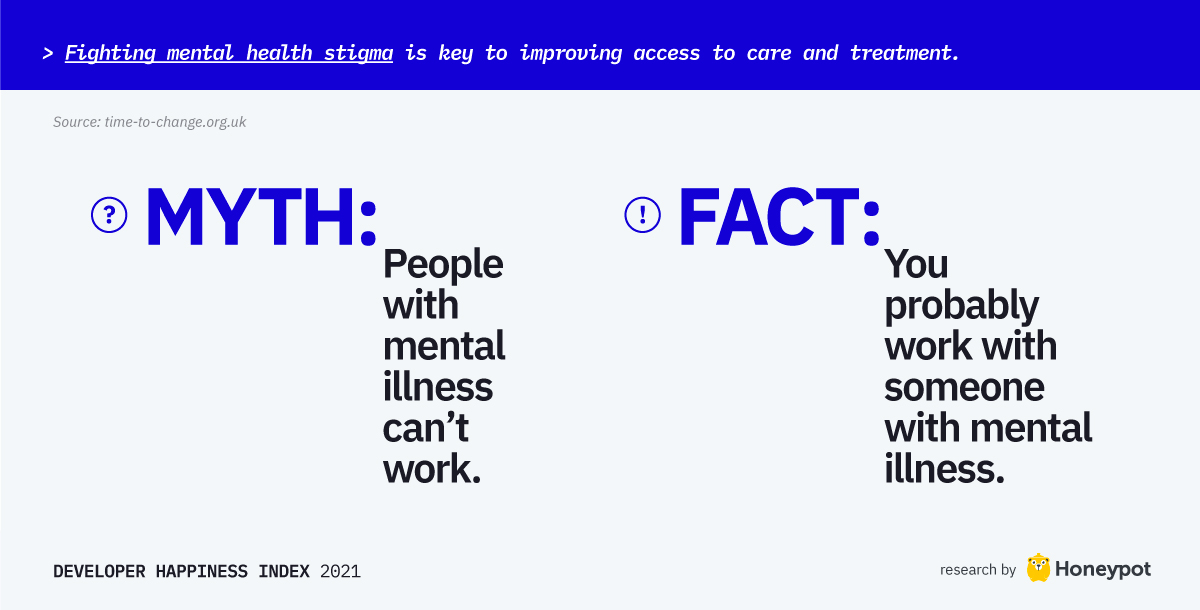
“I’d want to see more contributions or incentives for companies to take care of our mental health and give opportunities for therapy. I feel like it’s a kind of taboo to say to my boss, or even my work colleagues, that I need or have therapy because the work that I’m doing is very stressful.”
Aside from that, developers themselves should feel empowered to prioritize their personal mental health within the work context by sharing the burden with managers and colleagues, by setting routines, and understanding personal triggers.
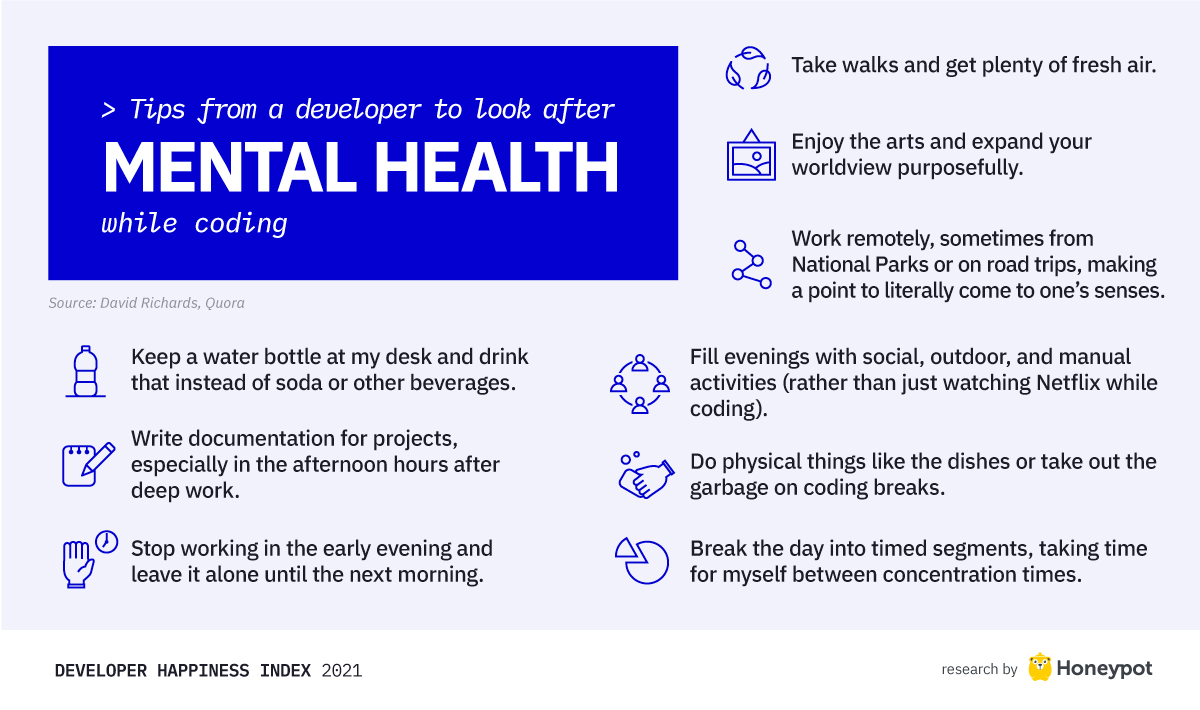
Popular quality of life indices, such as The Economist’s Liveability Index and Mercer’s Quality of Life index look at a city, rather than country level, giving a more nuanced picture of quality of life. Again, consistent with our findings, Vienna, Austria’s capital city, and Copenhagen, Denmark’s capital, feature in both lists.
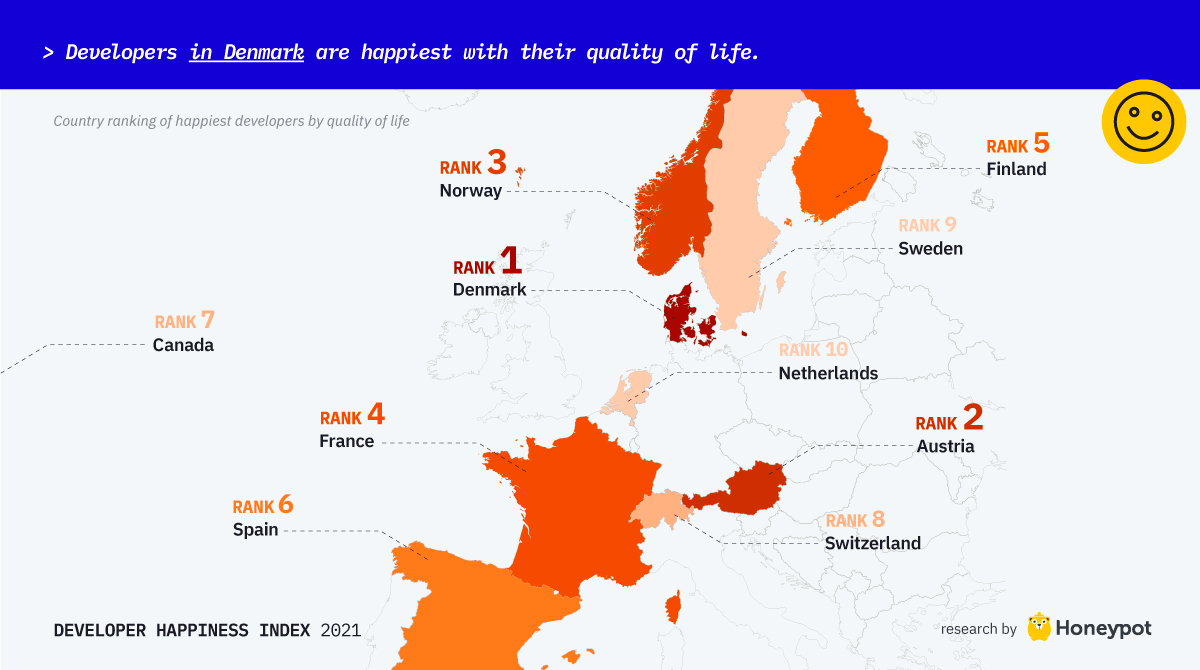
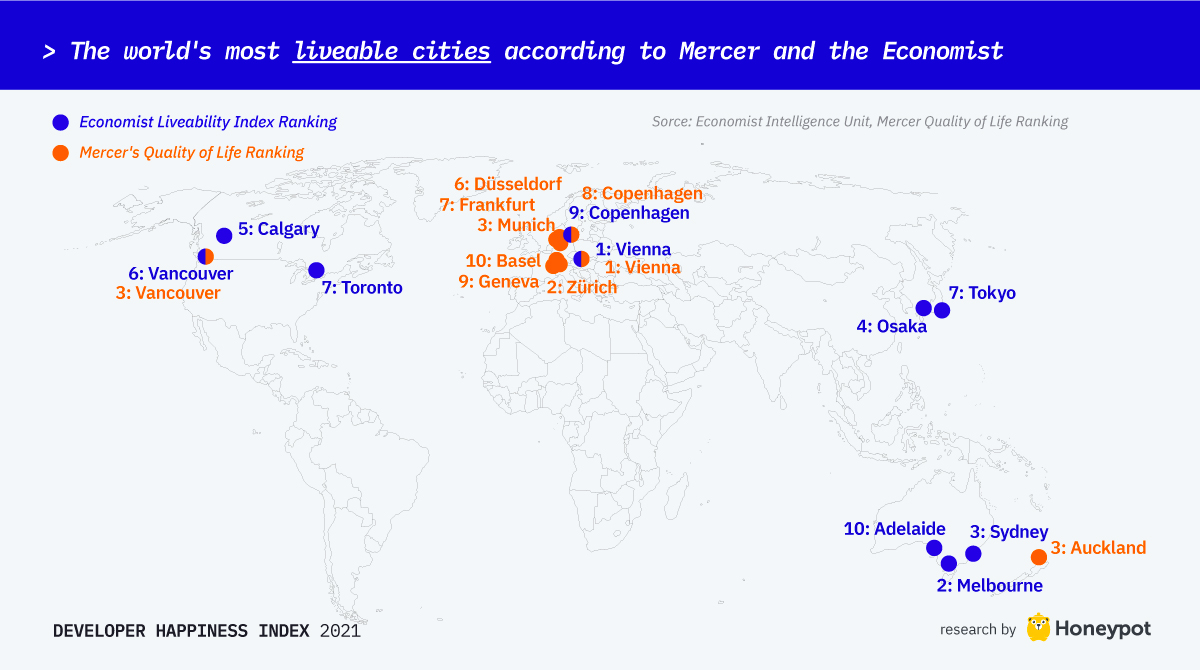

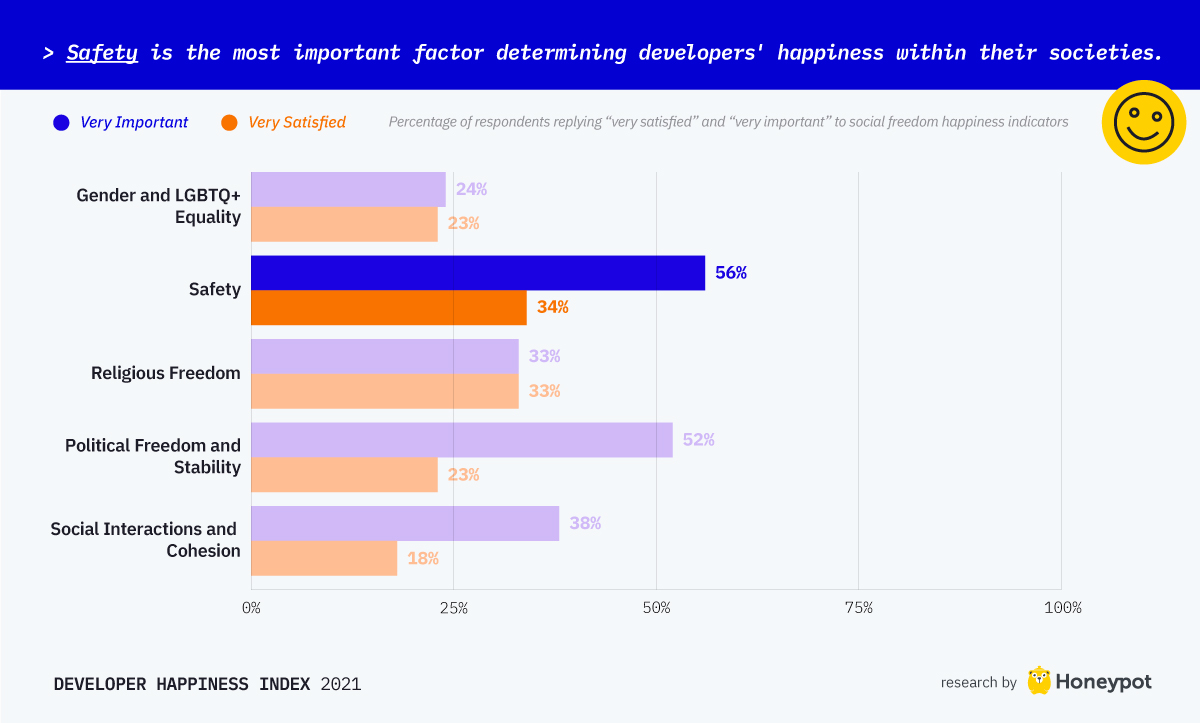
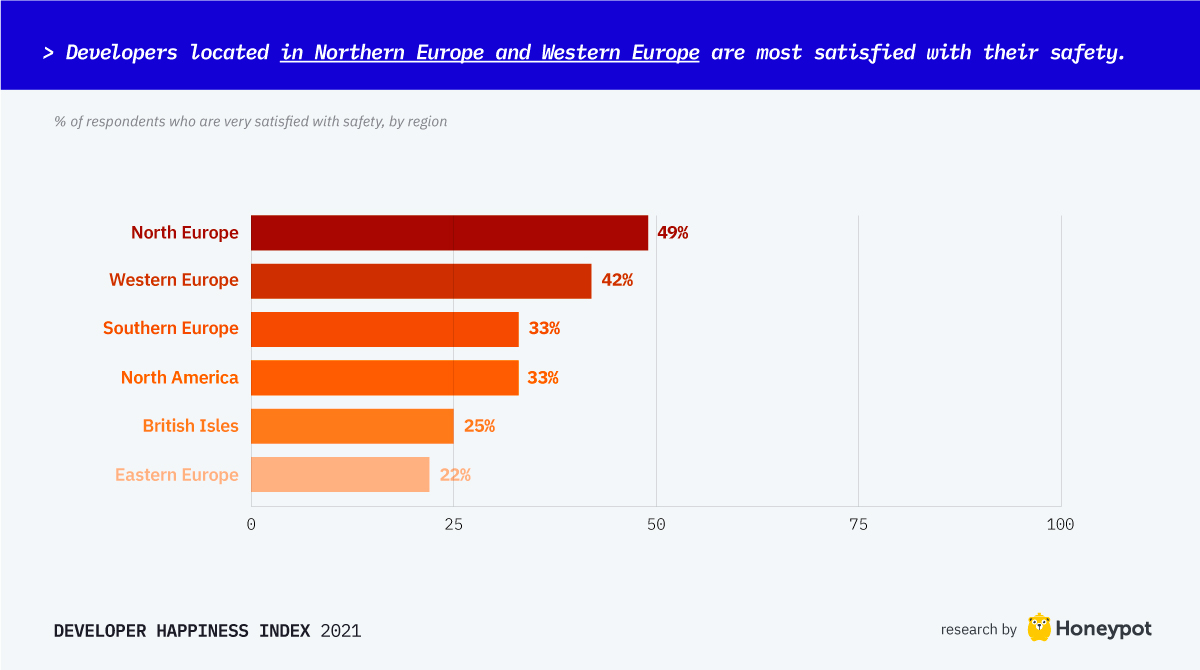
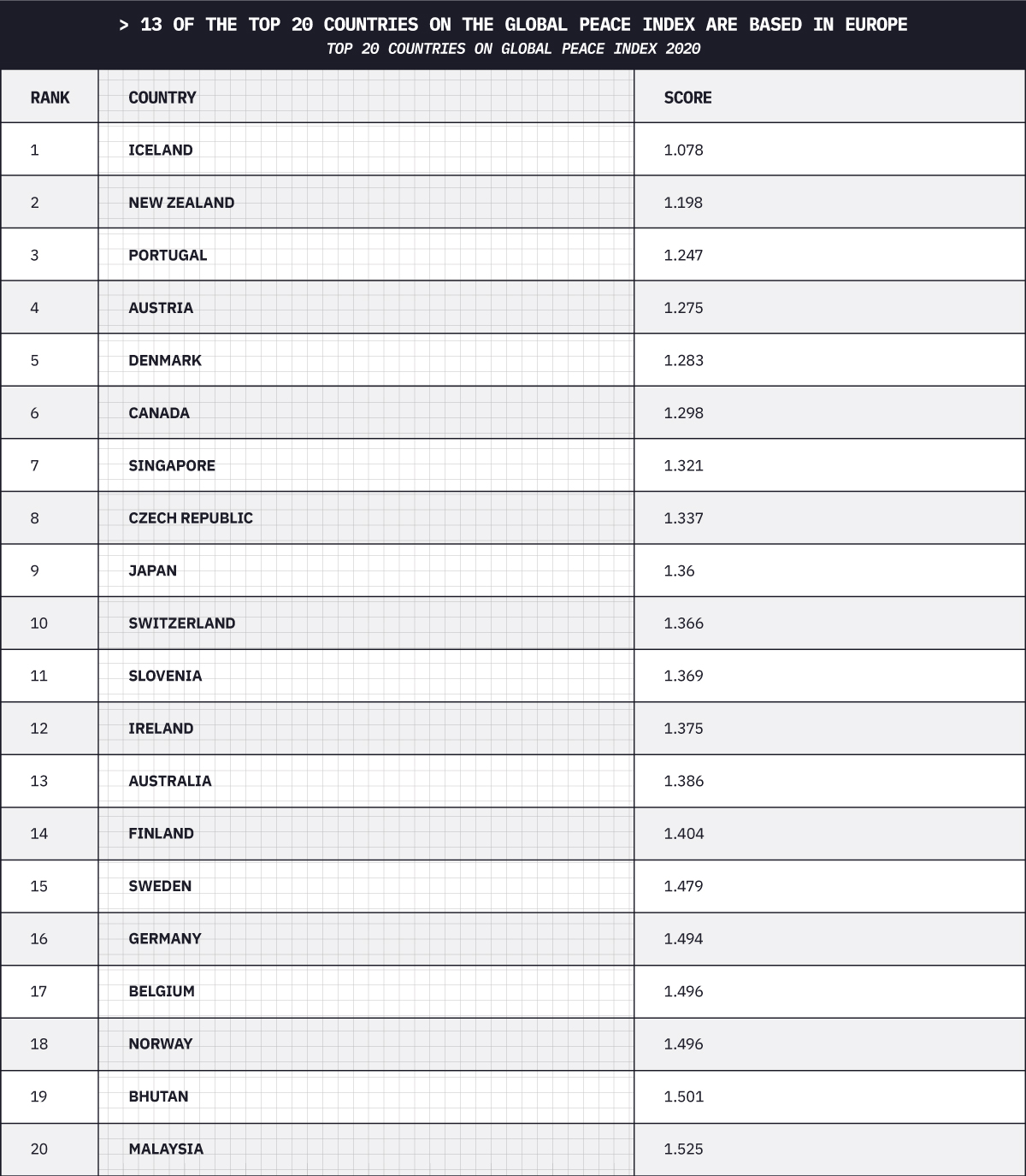
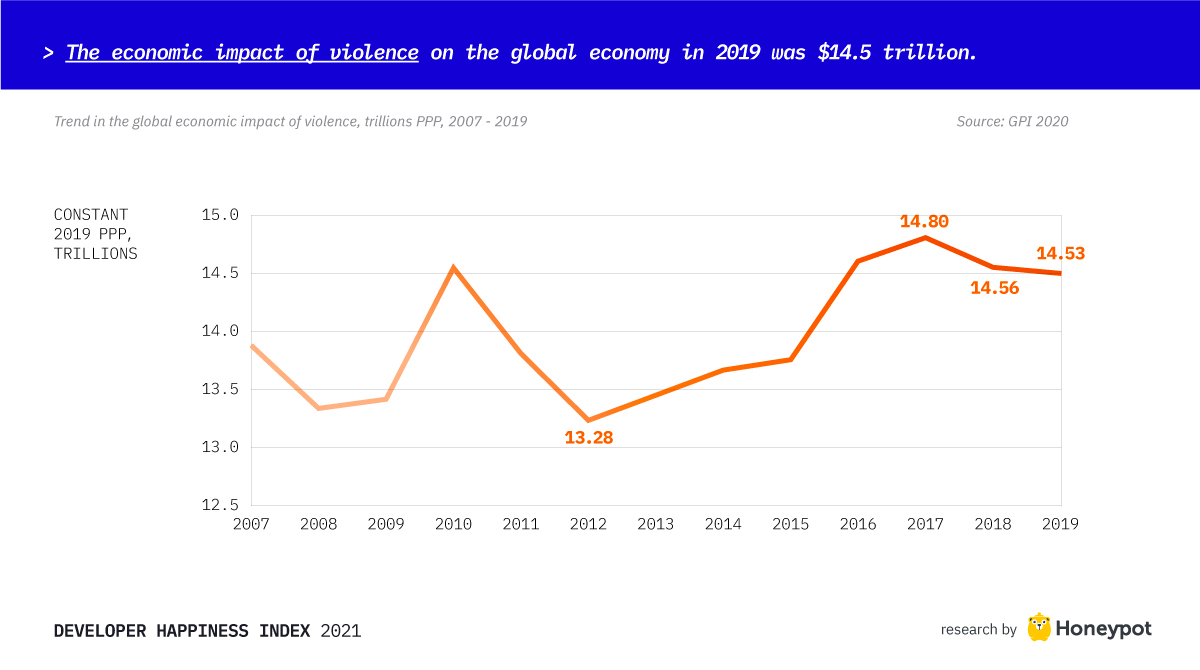
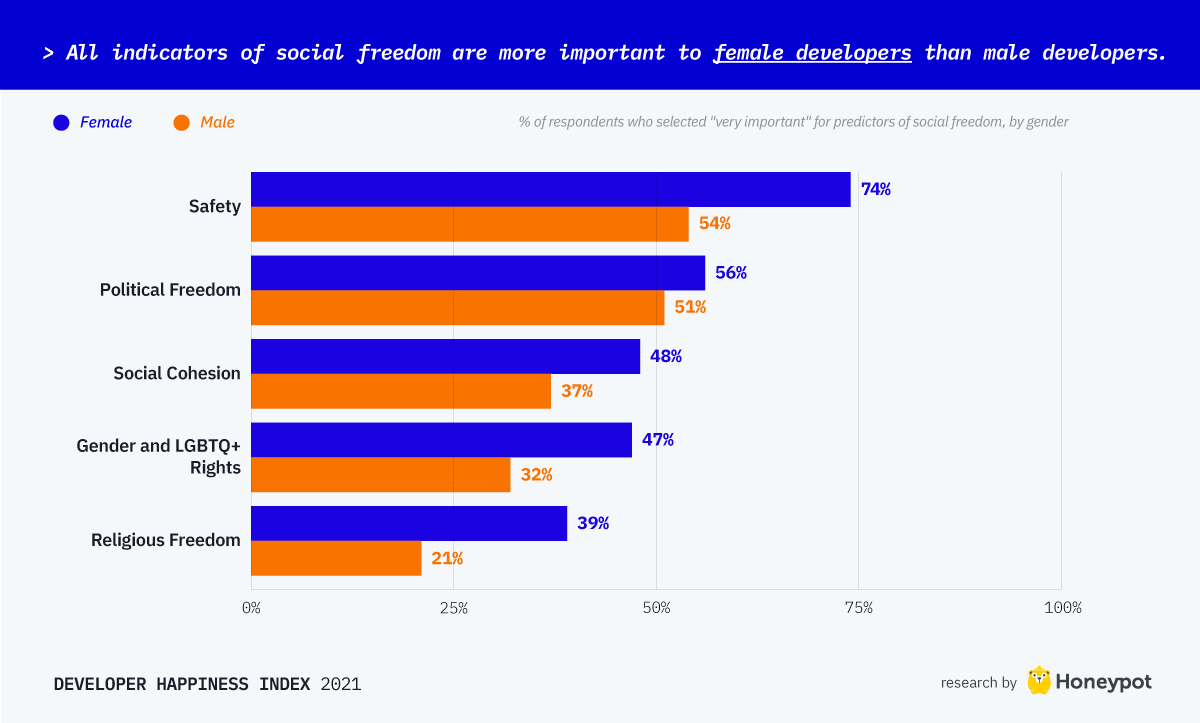
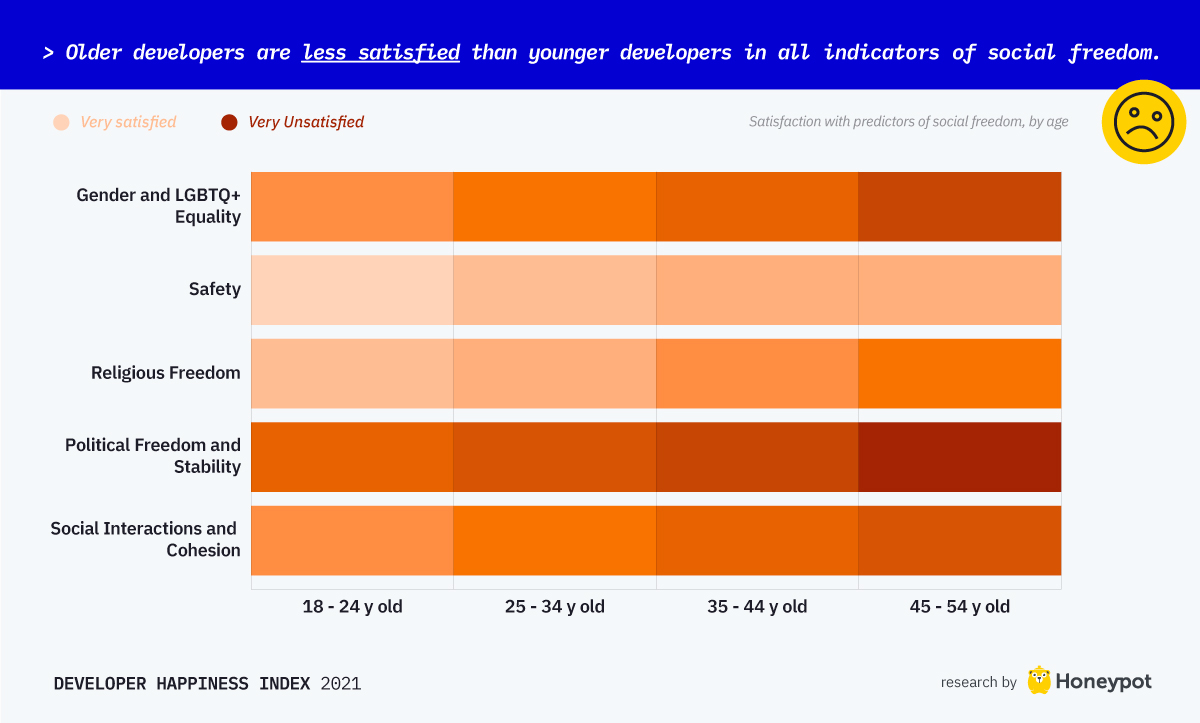
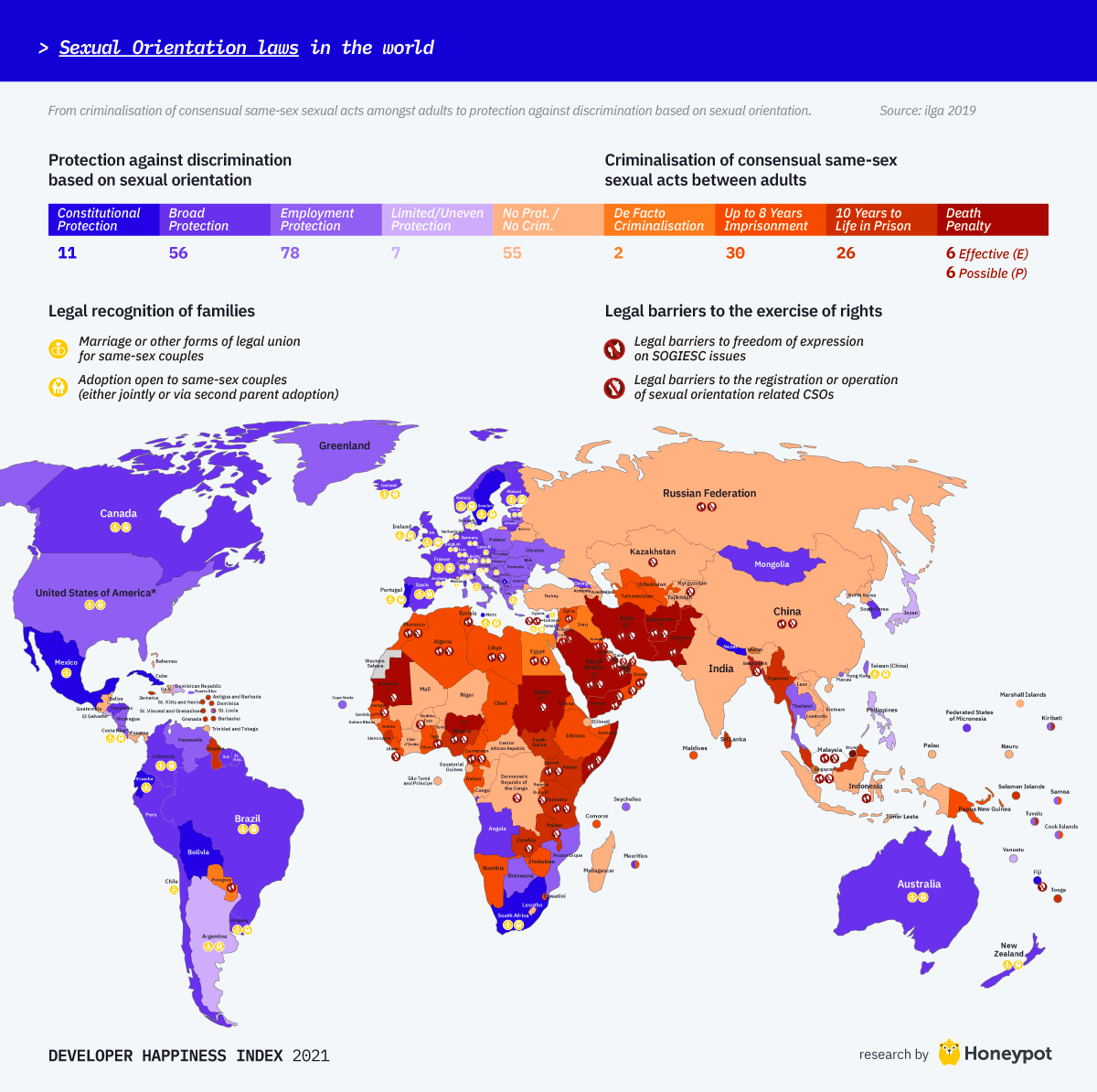
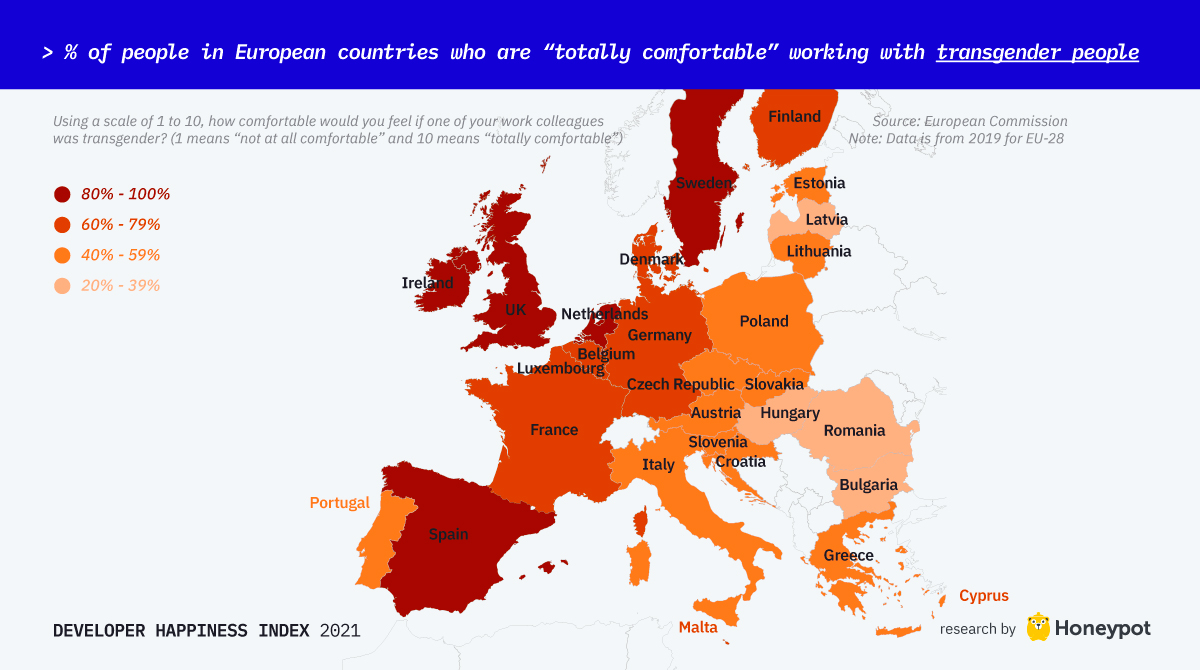
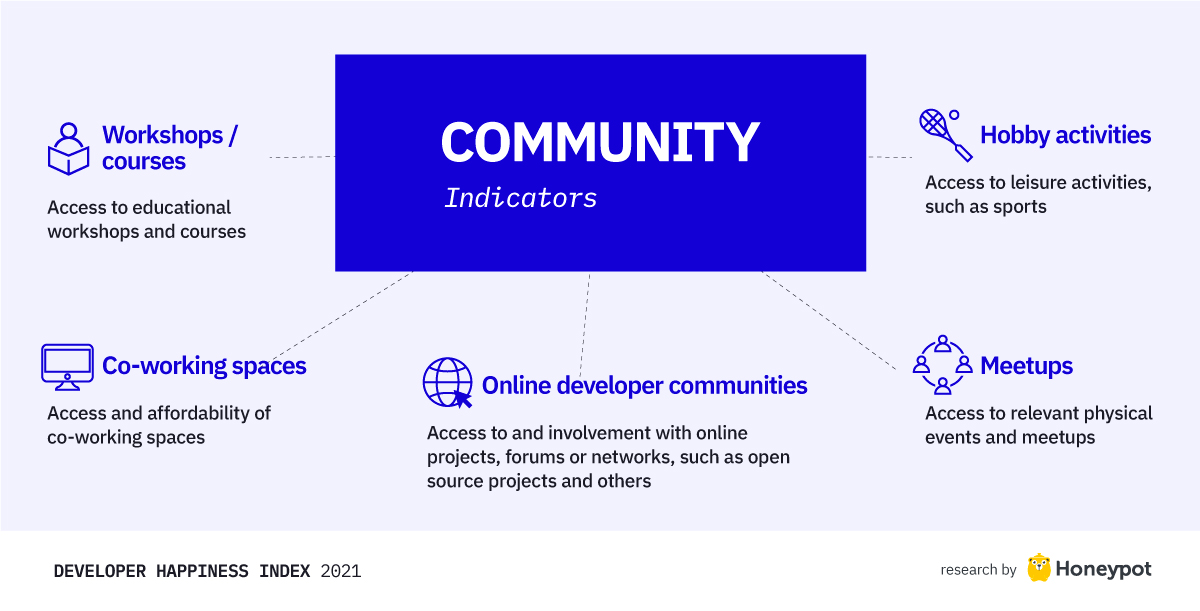
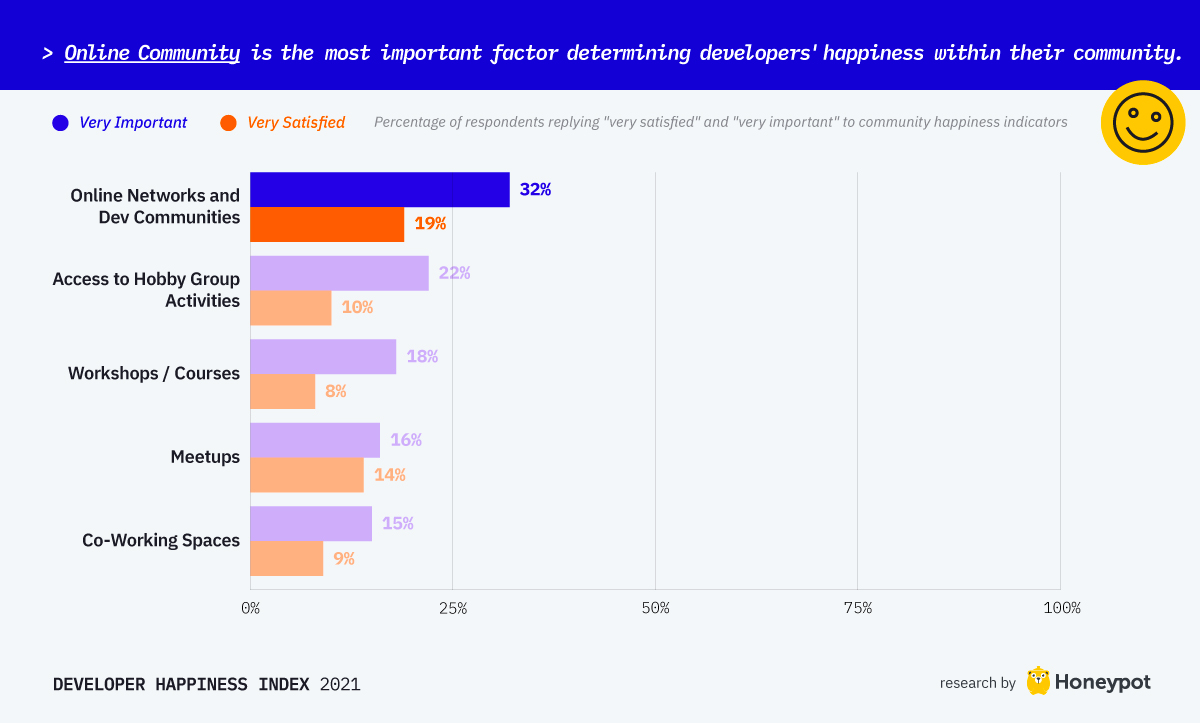
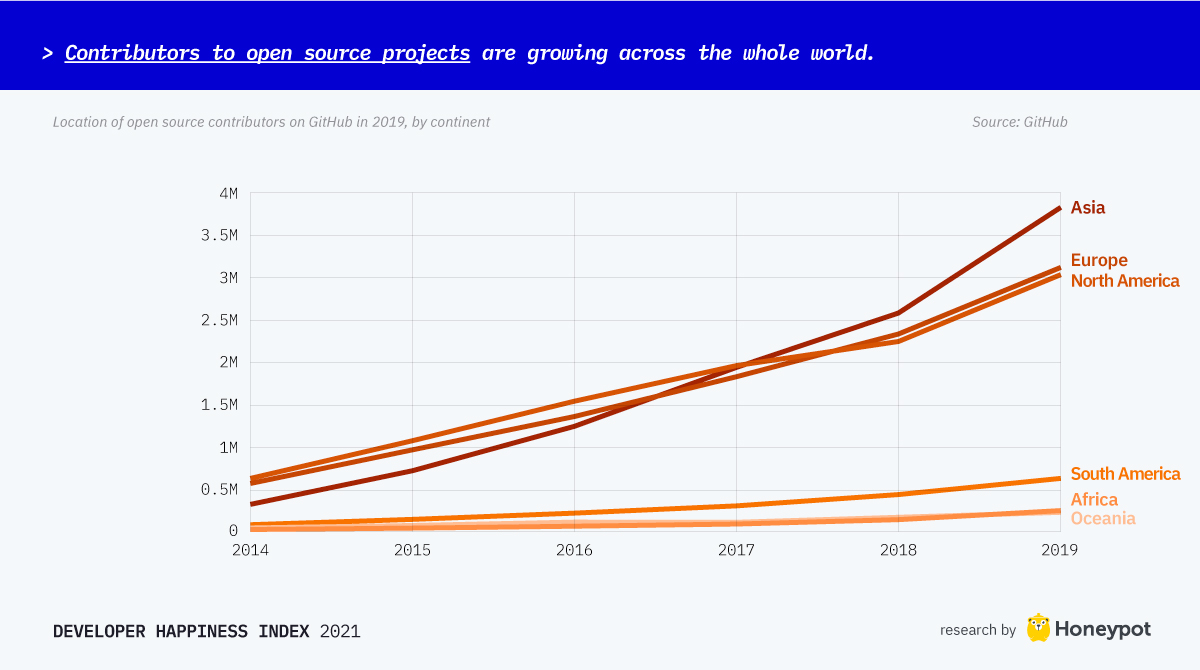
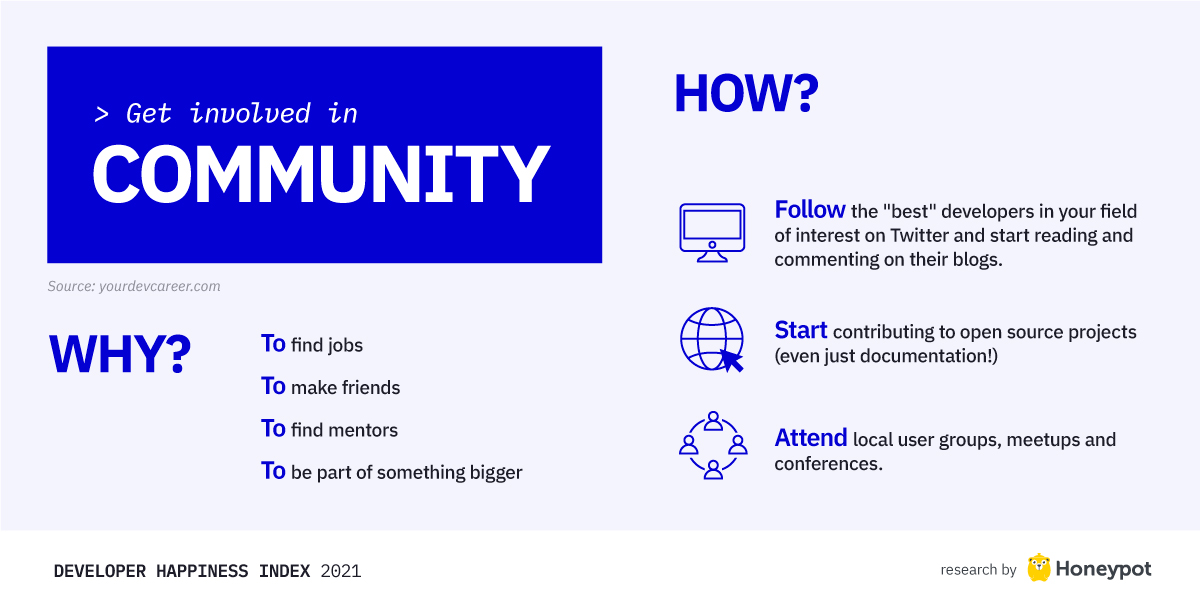
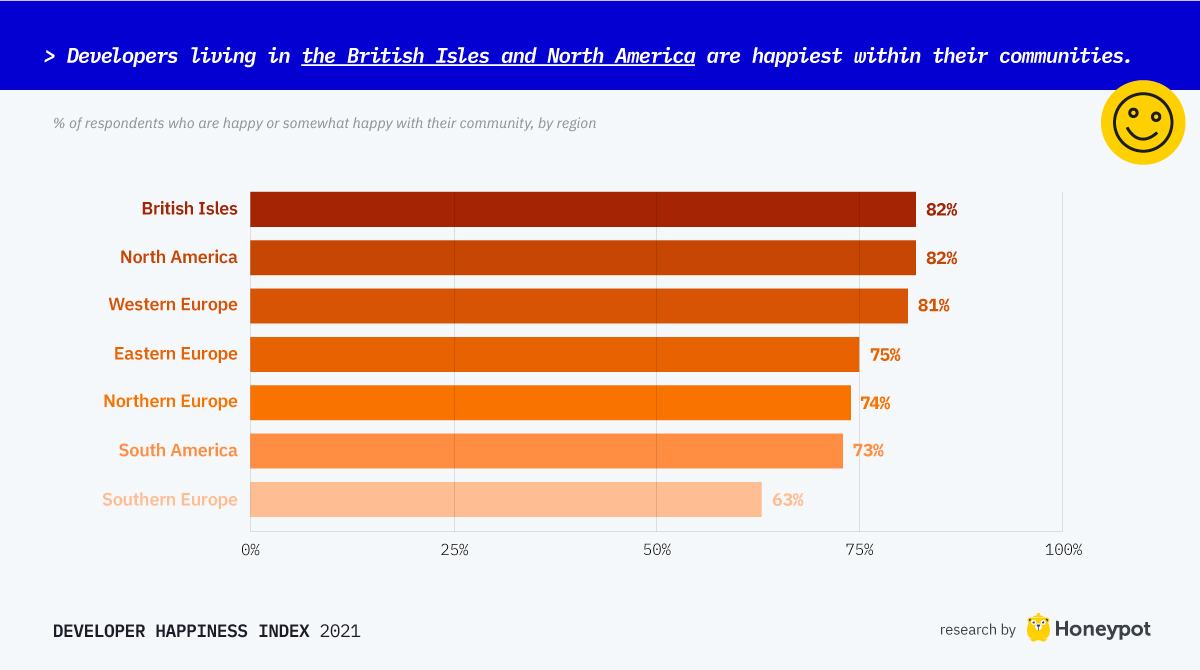
Summary
With this report, we sought to better understand developer happiness and well-being by exploring four key factors: career, quality of life, social freedoms, and community. Well-being operates in a self-reinforcing positive feedback loop — happiness in one area of your life drives and impacts your happiness in others.
Our research highlights how developer happiness drives productivity, motivation, and code quality. We show the importance of work-life balance, positive work environments, and learning opportunities. We also demonstrate that happiness is more than just a satisfying career and that psychological and physical safety, access to healthcare, and online communities also play significant roles in a developer’s happiness.
Our data also highlights some disparities between segments of the developer population. Geographically, Northern European developers are the happiest. Age-wise, developers at the start of their career tend to be more satisfied than more experienced developers — perhaps not a surprise given ageism in tech starts at 29.
We also found differences in how male and female developers attribute their happiness. Female developers are happier overall. And despite a noticeable pay gap, female developers are more satisfied with their salaries than their male counterparts. Whatsmore, female developers consider all social freedom factors to be more important to their happiness than men do.
As research around developer happiness grows, we hope to see more organizations creating and fostering improved working conditions and, in turn, promote healthier and happier environments for developers. We also hope to see developers continue to prioritize their happiness by making informed decisions about their work and lives.

If you liked the article, do not forget to share it with your friends. Follow us on Google News too, click on the star and choose us from your favorites.
For forums sites go to Forum.BuradaBiliyorum.Com
If you want to read more like this article, you can visit our Technology category.




Snapshot social freedom